Science, Technology, Engineering and Mathematics (STEM) News
Passionate mentor is change agent in College of Forestry, Wildlife and Environment
An associate professor in Auburn University’s College of Forestry, Wildlife and Environment (CFWE), Soledad Peresin’s expertise lies in biopolymers and analytical chemistry; nanocomposites; nanotechnology and materials; and polymers and surface science.
But when you meet Peresin, these words bubble to the surface: an impassioned mentor devoted to creating equal opportunities for a diverse and inclusive population of students.
A first-generation college student from Argentina, Peresin said, “I am the only one in my family who ventured to graduate school, and to study abroad. It was a big learning curve, but I encourage everyone to try something new. You are capable of a lot more than you think.”
It’s this belief in others’ success that drives Peresin to be an agent of change — whether leading women in science, advancing DEI (Diversity, Equity and Inclusion) initiatives, fostering innovative solutions or mentoring a new generation of scientists.
NEXT WISE LEADER
Peresin recently was chosen as the next Women in Science and Engineering (WISE) Institute chair; WISE resides within Auburn’s Office of Inclusion and Diversity. Peresin said the mission of WISE is “to enable and sustain equitable quality of life and experience for women in the university.”
WISE advocates for and enables opportunities for both STEM (Science, Technology, Engineering and Mathematics) and non-STEM female students, faculty and staff on campus. Mentoring is especially important.
“We want to create a network in which women can talk to other women and peers who may have gone through similar challenges in the university environment, so they can all thrive,” Peresin said.
For example, WISE presents opportunities to undergraduate students that include research and study abroad opportunities, faculty introductions and the Together Embracing Successful Scholars (TESS) Talk series. Peresin also is focused on “first identifying and then embracing participation of allies in this women’s group. This includes everyone who is not a female or identifying as female but cares about the equality and advancement of women.”
As a single mom with a 9-year-old child and an active academic career, Peresin is aware of the challenges of balancing her personal and professional lives. She wants WISE to help others.
“I want women to know they are not alone in this enterprise,” she said. “A lot of women go through challenges in professional careers. Opportunities are not always equal or even there. But I am a very passionate advocate of equity and inclusion.”
DIVERSE EXPERIENCES SOLVE COMPLEX CHALLENGES
Peresin serves on the Advisory Board of the Young Professionals in Training (YPIT) program, offering mentoring and tutoring for fifth-12th grade underrepresented students, and works closely with the Minorities in Agriculture, Natural Resources and Related Sciences (MANRRS) Auburn chapter, housed in CFWE.
Serving as chair of the CFWE DEI Committee and CFWE DEI representative at the Faculty Senate level, Peresin believes in the power of bringing diverse minds and experiences to the table to tackle complex challenges.
“The good news is we face a generation that has a clear understanding that, without a diverse pool of people, you cannot make advances, especially in the field of science,” Peresin said. “The only truly translational research, the base of making significant advances, relies on diversity. Everyone brings something to the table.”
PASSION FOR THE SUSTAINABLE BIO-BASED MATERIALS LABORATORY
“The goal of the Sustainable Bio-based Materials Laboratory is to utilize biomass, like wood, soybean hulls or byproducts from any other agroindustrial activity, and add value by creating new products which are sustainable. We want to create sustainable solutions for issues of environmental concern,” Peresin said.
And Peresin and her cohort of researchers are making that happen.
In the spring, 17 people worked in the lab. Ten are working there so far this fall, including a variety of researchers: graduate students, post-docs, visiting scholars and professors and even undergraduate students. Undergraduate students start by shadowing an existing team member on an existing project, and then Peresin encourages them to formulate their own research question and project.
Examples of the work in the lab include:
- Using biomass materials to replace adhesives for wood products with lower formaldehyde emissions
- Utilizing by-products from forestry and agriculture industries for added value product development
- Developing bio-based diagnostics platform for emerging contaminants and allergens
- Cultivating solutions to alleviate mosquito-borne diseases such as malaria with single-use detection devices and bio-based insecticidal nets
- Improving the innovation portfolio and profitability of the forest products industry
Combining research and equity, Carly Cummings, one of Peresin’s doctoral students, developed environmental science education models for water remediation made from biomass, in hopes to extend STEM literacy in Alabama. Auburn High School implemented her program, and other schools across the state are modeling it. Peresin anticipates the program will be adopted by Alabama Science In Motion in the near future.
FOREVER A MENTOR
It’s evident in her many roles Peresin is a consummate mentor.
“I had wonderful mentors myself. In fact, I wouldn’t be here if I did not have those mentors,” said Peresin. “I do wish in some instances in my career that I would have been bolder and asked for more help. I do not think college students are aware of how many opportunities they have. I am working on breaching that gap.”
Peresin sees the mentor-mentee relationship as an opportunity for both to become more well-rounded professionals, and she believes it should be fun.
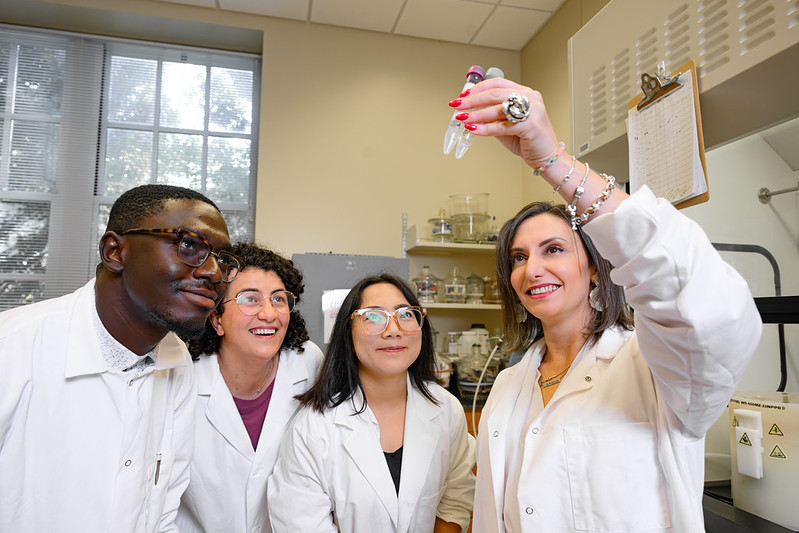
Soledad Peresin, right, is pictured with researchers in the Sustainable Bio-based Materials Laboratory of the College of Forestry, Wildlife and Environment.
Categories: Science, Technology, Engineering and Mathematics (STEM), Energy & the Environment
Computer science and software engineering researcher leads collaborative project aimed at meeting needs of Native American, Latina and Black women in computing
While much research into student and employee experiences in computer science focuses on specific demographics, few studies provide insight into intersectional circumstances.
Jakita Thomas, the Philpott-WestPoint Stevens Associate Professor in computer science and software engineering, plans to change that. Her collaborative project, “Intersectional Computing,” was awarded a one-year, $204,324 National Science Foundation (NSF) Early-Concept Grant for Exploratory Research (EAGER), which will serve as a springboard toward establishing a more inclusive and actionable research agenda focused on Native American, Latina and Black women in computing.
It begins with the NSF’s 14 Broadening Participation in Computing (BPC) alliances. One focuses on Black populations. Another focuses on women in technology. Others represent identity-inclusive and Latina populations.
“Each alliance focuses on a different community and what often happens is none of those groups serve an intersection, or cross section, of needs,” Thomas said. “Those experiences will be unique. Research has often reported in computing that Black women experience microaggressions and they are not able to decipher whether it's happening because they're Black or because they're a woman. When you focus on only race, or gender, people fall through the cracks who have different experiences. We know from intersectional computing that it's important to address the complexities of lived experiences of people in various groups.”
Thomas will implement a series of workshops, beginning next summer with a five-day intensive, to engage members of the BPC Alliances and Black, Latina and Native American women graduate students to develop a community of support in the field of computing. Feedback from the workshops will result in future research, Thomas said.
“The workshops are going to be about understanding work that the alliances are doing, understanding the populations they're currently serving, and the intersectional experiences present among those populations,” she said. “Then we need to help them consider what they're already doing that might be supporting those populations and design new interventions with intersectionality in mind to provide stronger support.
“From this, we hope the alliances will understand the core constructs of intersectionality, and understand the matrix of domination and how it functions inside of computing. Then they'll reframe their own practices and programs toward redesigning these interventions and projects to be truly inclusive and intersectional.”
Another workshop component includes reading groups, Thomas said. Many researchers engage in broadening participation and computing work with intersectional populations, but are unaware of literature that exists around the lived experiences of intersectional populations and how those experiences are unique from the dominant experiences that typically happen. “Familiarizing the community with that literature will be helpful, especially as it relates to designing new interventions that account for intersectional populations,” Thomas said.
Ultimately, Thomas believes EAGER would support building a community around intersectional computing that not only serves as a resource to the alliances, but also to build community around other scholars who are doing this type of work.
“The goal for us is to become another alliance that can help not only support the current alliances, but also expand intersectional computing,” she said.
Media Contact: Joe McAdory, jem0040@auburn.edu, 334.844.3447
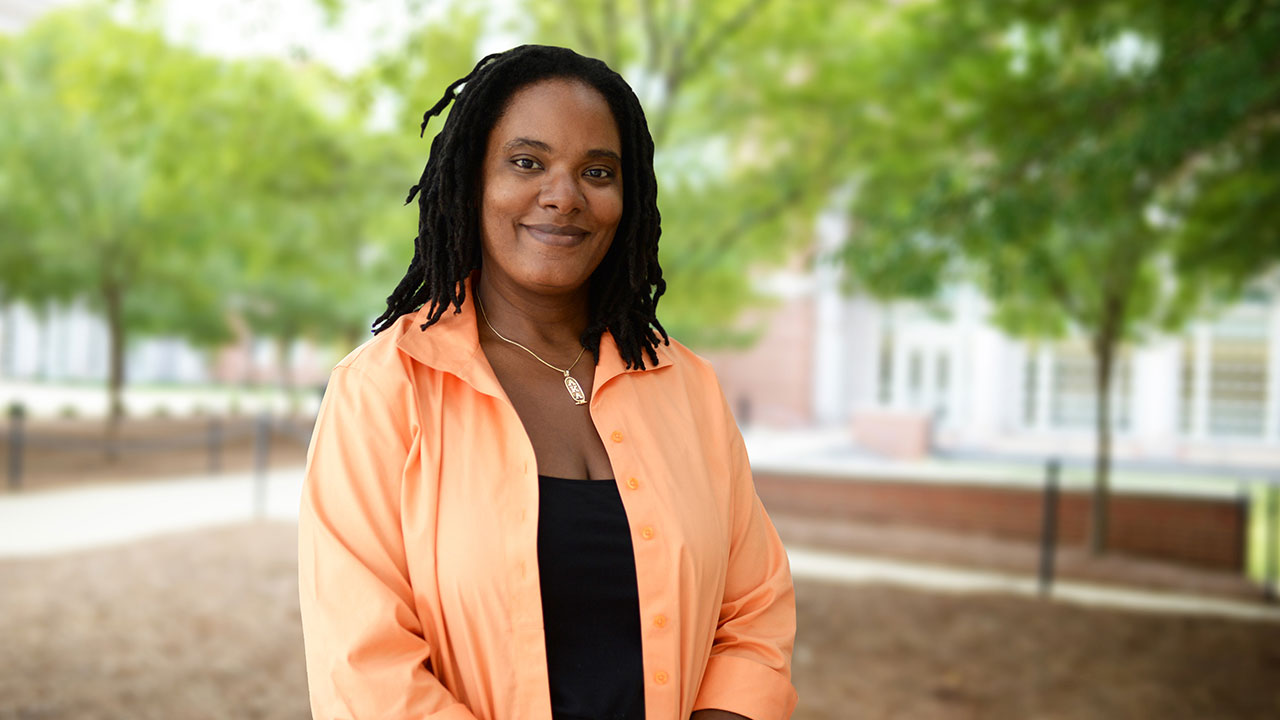
Jakita Thomas
Categories: Science, Technology, Engineering and Mathematics (STEM), Engineering
Auburn ranked in top 100 of U.S. research institutions for second straight year
For the second straight year, Auburn University is ranked in the top 11% of U.S. research institutions, coming in at No. 100 among 915 universities, according to the National Science Foundation’s most recent Higher Education Research and Development, or HERD, Survey.
Among public universities, Auburn is ranked No. 68 out of 412 institutions. The university also increased its research and development spending overall by $11.1 million in 2021.
“Auburn’s second year of ranking among the nation’s top 100 research institutions continues to be a significant accomplishment,” said James Weyhenmeyer, Auburn’s vice president for research and economic development. “Our researchers continue to be committed to engaging in impactful research—much of which is critical to supporting major Alabama industries—and that commitment is reflected in Auburn’s being highly ranked once again.”
The annual survey, compiled from fiscal year 2021 research expenditures, saw Auburn hold its position in the rankings’ top 100 even as 10 other SEC schools saw their positions fall. During the five-year period from 2017-21, Auburn’s annual research expenditures increased from $190.3 million to $266.4 million, resulting in a rankings jump of 14 places.
For universities without a medical school, Auburn again ranked No. 61 nationally and No. 1 in the state. Auburn also was highly ranked nationally in a number of specific fields of research, including No. 51 in engineering (up three spots), No. 53 in mathematics and statistics (up one spot) and No. 94 in physical sciences, all state bests. Auburn also ranked No. 41 for non-science and engineering research expenditures (up two spots). These fields include business administration, management, communications, education, humanities, social work and human sciences.
A hallmark of Auburn’s research is the diversity of its funded projects. Highlights include:
-
The U.S. Department of Agriculture recently awarded Auburn’s College of Forestry, Wildlife and Environment $2.1 million for studies into mitigating needle blight, a growing threat to pine trees. According to EDPA, the forest products industry is the state’s largest manufacturing industry. A second USDA award of more than $1.5 million is funding another study in the college aimed at reducing the effects of climate change through forest carbon sequestration.
-
The Auburn College of Agriculture’s Department of Poultry Science was awarded more than $1.2 million for research into sustainable poultry processing, as well as received additional funding of approximately $1.3 million for a study of the effects of environmental conditions in production efficiency and product quality in commercial poultry operations. Like forestry, poultry production is another major industry in Alabama. Alabama ranks fourth in the nation in broiler (chicken) production.
In addition to the high ranking in the NSF HERD Survey, Auburn is recognized by the Carnegie Classification of Institutions of Higher Education as a top-level, or R1, university with “very high research activity.”
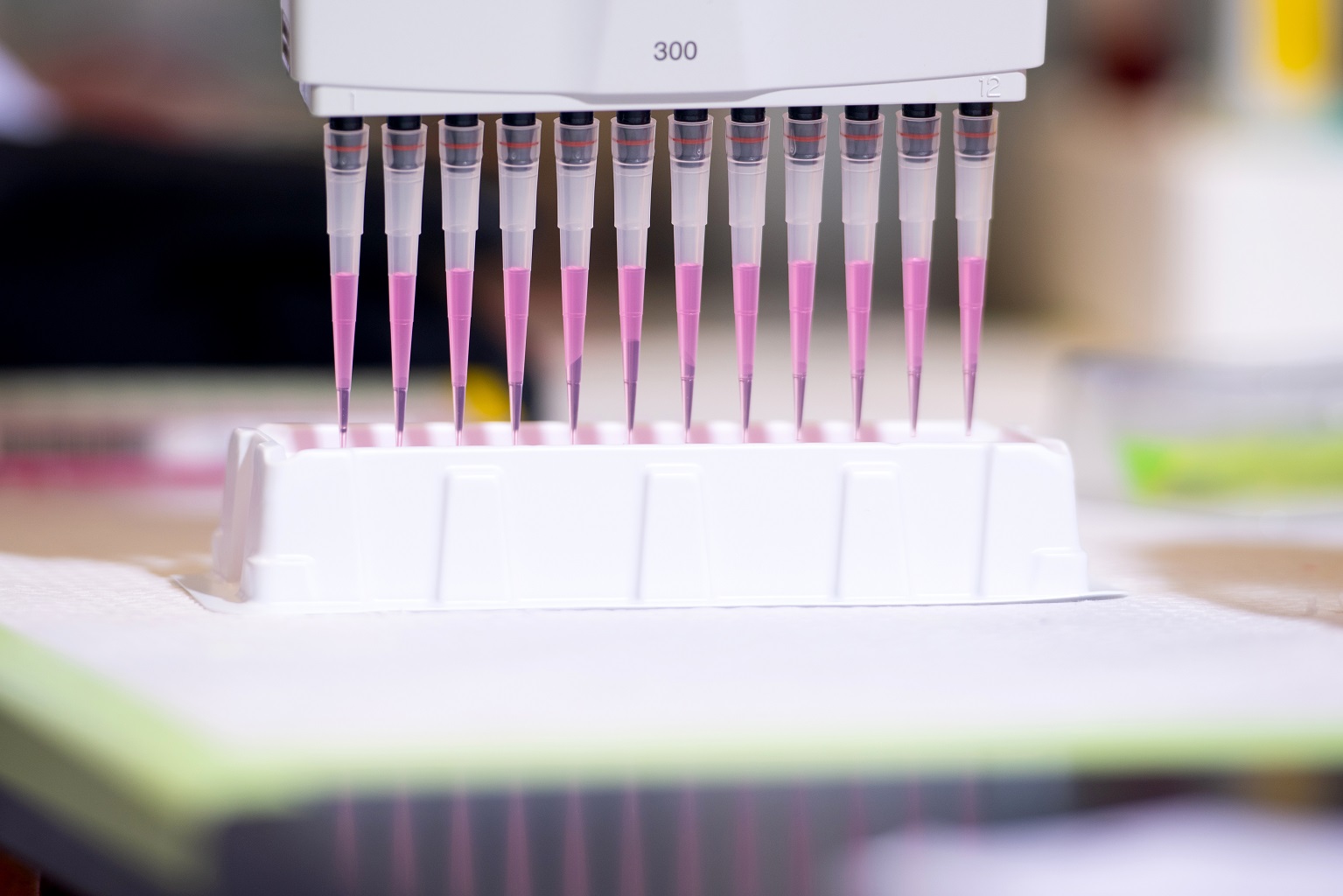
Categories: Science, Technology, Engineering and Mathematics (STEM), Food Systems, Engineering, Auburn In the News, Education, Agriculture, Liberal Arts
Auburn-based programs become institute to promote STEM education for underrepresented, underserved populations
Building on a $10 million National Science Foundation, or NSF, grant obtained last August, an Auburn University-based program has expanded into a multi-institutional institute to lead a national and international research effort to promote science, technology, engineering and mathematics, or STEM, education among students from underrepresented and underserved populations.
Dubbed the Institute for Strengthening Pathways and Research Knowledge in STEM, or the SPARK STEM Institute, the institute aims to engage science, technology, engineering and mathematics teachers and faculty, social science researchers, K-12 and higher education administrators and the community. That engagement will be designed to create and evaluate innovative research-based models for improving student academic and social experiences to attract, retain and graduate more historically underrepresented and underserved populations in STEM disciplines locally, regionally, nationally and internationally, according to Overtoun Jenda, assistant provost for special projects and initiatives at Auburn, whose office will be administering the initiative.
“The programs at the institute include African Americans, Alaska Natives, Hispanics, Native Americans, Native Hawaiians, Native Pacific Islanders, persons with disabilities, persons from economically disadvantaged backgrounds and women and young girls,” Jenda said. “Over the life of this institute, our overarching goal is to increase the college and workforce readiness and associate, undergraduate and graduate degrees in STEM disciplines among these groups.”
The SPARK STEM Institute will award scholarships, stipends and internships to participating students, Jenda explained.
“However, our core effort is to provide mentorship and guidance to encourage and support student successes,” Jenda said.
Comprised of eight core partner institutions in the Greater Alabama Black Belt region, the SPARK STEM Institute takes a multi-targeted focus on areas that include state, regional, national and international objectives and participants from government, industry, national and local organizations and more than 60 affiliate institutions that are collaborating with the institute on various ongoing projects and initiatives.
“This will be achieved and sustained by leveraging funding sources, conducting impactful service, involving exceptional and engaged faculty and mentors and developing creative and transformative research-based models for improving academic performance and social integration in STEM disciplines,” Jenda said.
“This major award from the National Science Foundation and the establishment of the SPARK STEM Institute will allow Auburn and collaborating institutions to foster a more diverse workforce while improving educational opportunities for students with disabilities,” said James Weyhenmeyer, Auburn’s vice president for research and economic development.
SPARK STEM Institute consists of two informal STEM centers: namely, SPARK STEM Center for Persons with Disabilities and SPARK STEM Center for Underrepresented Minorities and Underserved Populations. The two informal centers will share the same goals but have two distinct areas of focus and initiatives.
The institute is administered through the Office of Special Projects and Initiatives and governed by a board of deans and directors. Each center has its own specialized advisory board.
Jenda will be assisted in the institute administration by others at Auburn, including Keri Hesson and Brittany McCullough with the Office of Special Projects and Initiatives, David Shannon with the College of Education and James Witte with the School of Aviation; as well as Carl Pettis, Alabama State University provost; and Mohammed Qazi, associate dean, College of Arts and Sciences at Tuskegee University.
A joint conference for two SPARK STEM Institute programs, the Greater Alabama Black Belt Region Louis Stokes Alliances for Minority Participation, or GABBR LSAMP, and Making to Advance Knowledge, Excellence and Recognition in STEM, or MAKERS, was held April 23 at The Hotel at Auburn University and Dixon Conference Center. The institute has planned a multiday symposium involving representatives from each of the SPARK STEM Institute participating institutions for this fall at Auburn.
BY MITCH EMMONS
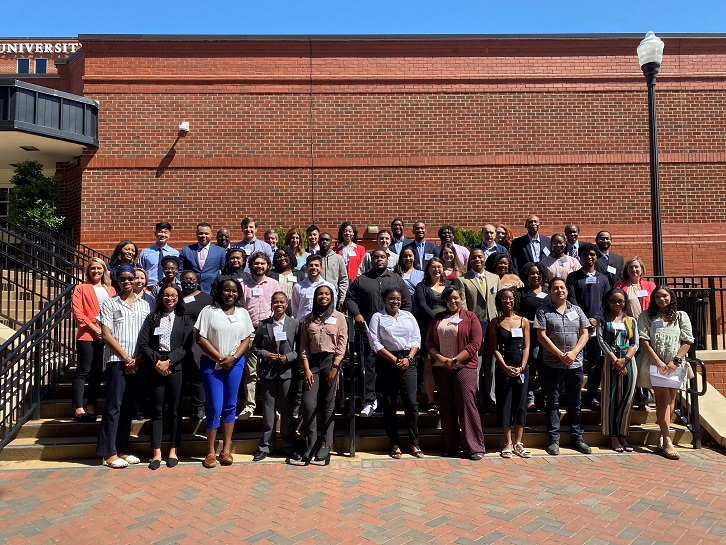 The 2022 LSAMP/MAKERS Scholars group from Auburn University, Auburn University at Montgomery and Southern Union Community College gathered with their faculty and alumni mentors at the institute’s conference on April 23.
The 2022 LSAMP/MAKERS Scholars group from Auburn University, Auburn University at Montgomery and Southern Union Community College gathered with their faculty and alumni mentors at the institute’s conference on April 23.
Categories: Science, Technology, Engineering and Mathematics (STEM), Education
Student passionate about inspiring women to pursue education in computer science
Sanjana Ruhani Tammim received her first computer when she was just five years old and instantly fell in love with the endless possibilities it offered.
“I was very engaged with this computer from the day I received it,” she said. “My family wanted me to become a doctor as they believed that would be a suitable profession for me as a female. But I loved computers and I wanted to be an engineer. With computers, you can choose your own path.”
Not only did Tammim, a first-year doctoral student in computer science and software engineering, choose her own path – she’s passionate about helping young women pursue their computer education dreams and open pathways of their own.
“I dreamed about working with computers,” said Tammim, who earned undergraduate and master’s degrees in information technology from Jahangirnagar University in Bangladesh. “Not all women in my country envision themselves as engineers, however. I was privileged to choose the career path I wanted. Therefore, my vision and passion are to encourage women beyond race, color and backgrounds to pursue their dreams.”
Tammim works as a graduate research and teaching assistant in the college’s Laboratory for Education and Assistive Technology directed by Daniela Marghitu. She was invited to develop her skills as a computer scientist and collaborate with experienced professionals at the prestigious 2022 Computing Research Association Grad Cohort for Women April 21-23 in New Orleans.
“It is a great honor to attend this notable graduate cohort for women in computer science and engineering and I am confident this cohort will provide me with tremendous opportunities to meet people and build networks who have similar interests,” Tammim said. “Moreover, I will enjoy face-to-face, insightful learning moments from fellow female researchers and mentors. I am thrilled to meet a diverse group of women who, I am assured, will support me to believe that I am not alone and will encourage me to thrive on my PhD journey.”
Grad Cohort for Women attendees will spend two days interacting with 20 senior female computing-related researchers and professionals, who will share pertinent information on graduate school survival skills, as well as more personal information and insights about their experiences. The workshop will include a mix of formal presentations and informal discussions and social events.
“Women at the conference, like me, will gather to motivate students, share their experiences and research topics,” Tammim said. “We will learn fresh ideas that we can apply to our own academic careers and learn how we can follow their examples. I also look forward to learning from peer students.”
Tammim hopes to learn fresh approaches she can apply to her own research: developing systems for assistive technology.
“I am currently working on developing learning systems that help children with special needs,” said Tammim, already an experienced classroom lecturer, who desires a full-time academic role once her doctorate is completed. “Some of these tools include augmented reality and virtual reality. I began this research last semester. There’s still a long way to go.”
BY JOE McADORY
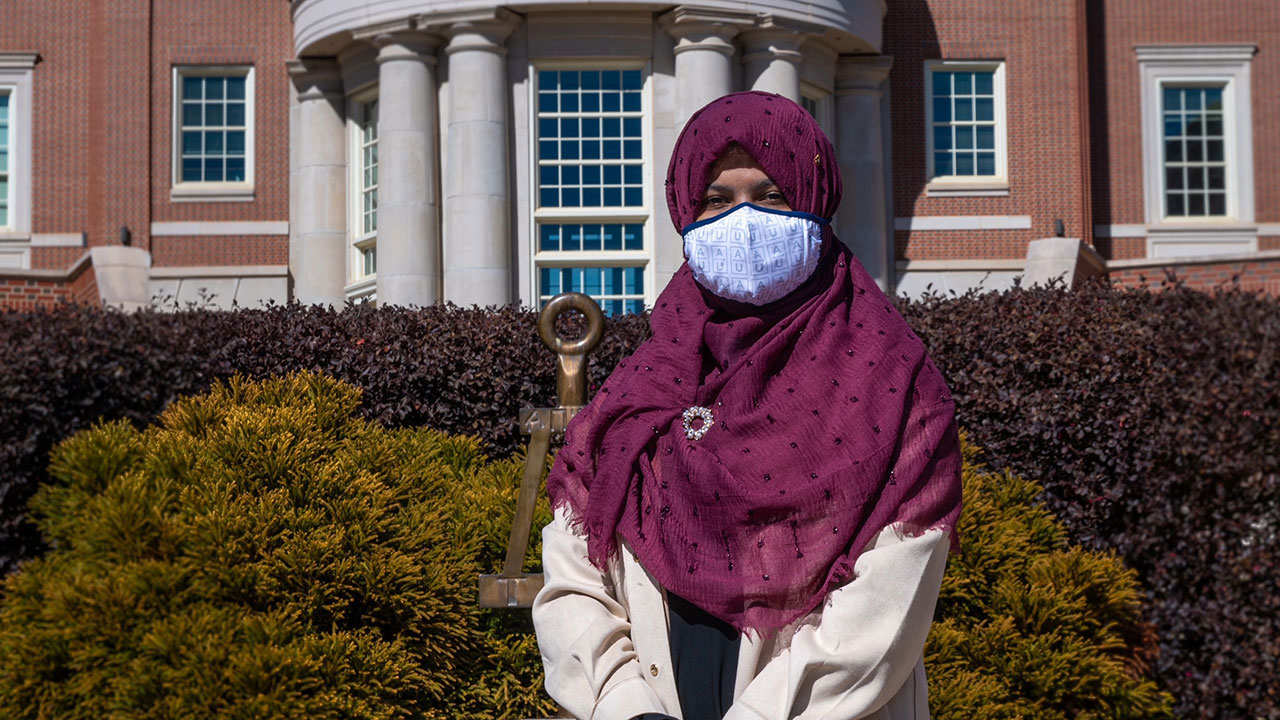
Sanjana Ruhani Tammim
Categories: Science, Technology, Engineering and Mathematics (STEM), Engineering, Graduate Student Research
Auburn University teams with Tuskegee University for STEM student research opportunities
A new collaboration between Auburn University and Tuskegee University aims to provide opportunities for Tuskegee students to explore new educational and career paths through STEM—science, technology, engineering and mathematics—research mentorships with Auburn graduate students and faculty.
Maria Soledad Peresin, associate professor of forest biomaterials in Auburn’s School of Forestry and Wildlife Sciences, established the collaboration with Michael Curry, chemistry and mechanical engineering professor at Tuskegee.
The partnership is part of Peresin’s National Science Foundation Faculty Early Career Development, or NSF CAREER, Award for which she was selected earlier this year. The award supports early-career faculty who have the potential to serve as academic role models in research and education.
Curry, who was recently awarded the 2021 HBCU—or historically black colleges and universities—Pioneering Award from the National Organization for Advancement of Black Chemists and Chemical Engineers, is excited about the prospects of this joint effort.
“This collaboration will create new opportunities for joint research projects and lab exchanges that will strengthen research outcomes for both labs. Specifically, I am especially excited that this research effort includes a significant boost for early-career STEM research opportunities for Tuskegee undergraduates.”
Peresin said the new program’s frame enables students to integrate research activities within their studies through a tier-mentorship program with graduate students.
“During these internships, students will acquire hands-on experience in the field of surface chemistry, material design and development, organic chemistry and applied engineering concepts,” she said. “This will increase their expertise and preparedness for a better transition into the job market.”
Curry and his team visited Peresin and her team July 13 at the School of Forestry and Wildlife Sciences for a daylong collaborative meeting. As part of the event, 15 students displayed posters about their research and delivered three-minute speeches to the group. The day also included networking activities and a tour of Peresin’s lab.
The collaboration was sparked earlier this year when Curry invited Peresin to speak to the American Chemical Society student chapter at Tuskegee. Through that event, chemistry major Jermya Hollins became the first Tuskegee student to join Peresin’s lab. Hollins is training in analytical techniques such as atomic force microscopy and dynamic light scattering, among other subjects. She is now beginning independent studies under the co-supervision of Curry and Peresin.
Joining Curry and Peresin’s teams at the July event were Scott Enebak, the Auburn School of Forestry and Wildlife Sciences associate dean for academic affairs; Michelle Cole, advisor of the Auburn chapter of Minorities in Agriculture, Natural Resources and Related Sciences, or MANRRS; and Ja’lia Taylor, coordinator of the Auburn Young Professionals in Training program.
“I thought the chemistry between all these people gave the meeting a great spin,” Peresin said. “It ended up not only being about our common research interest, but about the big picture.”
Tuskegee students participating in the collaboration said the opportunity had given them a new outlook on their studies and research work.
“Because of this event, my group was able to construct new research ideas and work on new collaborations, which opened doors for new students to join,” said student Morgan Fair. “I was recently on the fence of deciding if I wanted to continue my studies at the Ph.D. level and, after attending, I gained more confidence towards making a final decision.
“The advice I would give others would be to always take the opportunity to collaborate, because it opens new doors that could place you on the right path where you are destined to be.”
Another Tuskegee student, Johnathan Mitchell, said the collaboration has been especially impactful in his experience.
“Prior to this collaboration, I planned to pursue a career in the industry with my bachelor’s degree in mechanical engineering and my master’s degree in chemistry, but after seeing so much interesting research and talking to so many amazing people, I plan to continue my education at Tuskegee with a Ph.D. in material science engineering. I hope to attend the next collaboration event and those to come. I am grateful for this opportunity,” Mitchell said.
As a follow-up to these joint activities, Curry and Peresin are co-organizing symposia for the American Chemical Society at its November regional meeting in Birmingham and its national meeting in spring 2022 in San Diego.
The two also are working on a proposal for an NSF Research Experiences for Teachers site that would increase science and literacy in the state’s Black Belt region regarding the sustainable use and processing of materials.
BY TERI GREENE
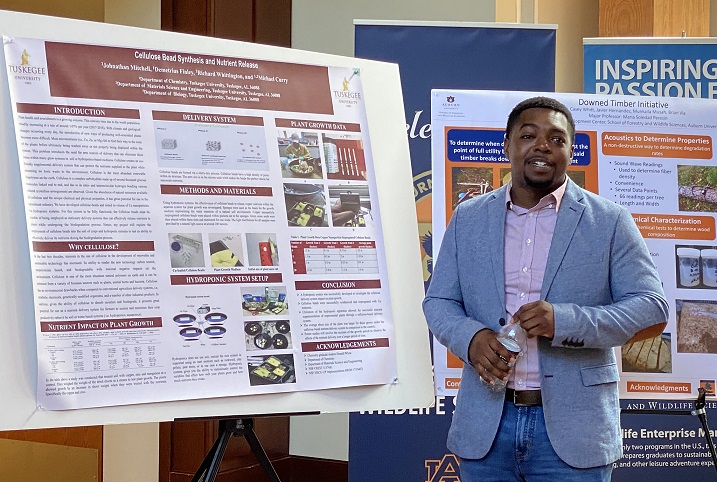
Tuskegee University master’s student Johnathan Mitchell participated in a daylong collaborative event as part of a new partnership with Auburn University’s School of Forestry and Wildlife Sciences to create a STEM research mentorship program with Auburn graduate students and faculty.
Categories: Science, Technology, Engineering and Mathematics (STEM), External Engagement
Auburn awarded $10 million by NSF to lead national STEM education initiative for students with disabilities
Auburn University has been awarded $10 million from the National Science Foundation, or NSF, to lead a national research effort to promote science, technology, engineering and mathematics, or STEM, education among students with disabilities.
The grant will support a five-year program that will grow as it progresses, says Overtoun Jenda, assistant provost for special projects and initiatives at Auburn, whose office will be administering the initiative.
“We are starting out as a 27-institution alliance,” said Jenda, a professor of mathematics in the College of Sciences and Mathematics. “The award was made official on Aug. 1, and the first 90 days involves the development of a strategic plan that will guide the alliance.”
The funding will be used to conduct research related to enhancing workforce development opportunities for persons with disabilities. The collaborative research effort is a national project aimed at increasing the number of disabled students entering college and completing a degree in a STEM-related field of study.
“This major award from the National Science Foundation will allow Auburn and collaborating institutions to foster a more diverse workforce while improving educational opportunities for disabled students,” said James Weyhenmeyer, Auburn's vice president for research and economic development.
Students will also receive benefits such as peer and faculty mentoring, research opportunities and financial support. The program has three primary goals: 1) increasing the quantity of students with disabilities completing associate, undergraduate and graduate degrees in STEM; 2) facilitating the transitions of students with disabilities from STEM degree completion into the STEM workforce; and 3) enhancing communication and collaboration among institutions of higher education, industry, government, national labs and local communities in addressing the education needs of students with disabilities in STEM disciplines.
“Persons with disabilities are one of the most significantly underrepresented groups in STEM education and employment,” Jenda said. “And they comprise a disproportionately smaller percentage of STEM degrees and jobs compared to their percentages in the U.S. population.
“This alliance is designed to help shrink that gap. Students will participate through stipends, internships conferences and mentoring.”
Auburn is leading this initiative that is subdivided into six regional hubs, according to Jenda.
“Auburn is overseeing the complete alliance, while at the same time leading the Southeastern Hub,” Jenda said.
Other hub-leading institutions include Northern Arizona University (Mountain Hub), The Ohio State University (Northeastern Hub), the University of Hawaii at Manoa (Islands Hub), the University of Missouri-Kansas City (Midwest Hub) and the University of Washington (West Coast Hub). Auburn is working closely with the University of Missouri-Kansas City, which functions as the backbone organization for the alliance to support communication, engagement, networked systems, data collection and analyses, sustainability, scaling and dissemination.
Jenda will be assisted in the program administration by others at Auburn, including David Shannon with the College of Education, Daniela Marghitu with the Samuel Ginn College of Engineering – a member of the NSF’s Committee on Equal Opportunities in Science and Engineering, or CEOSE – Brittany McCullough with the Office of Special Projects and Initiatives and Carl Pettis, provost for Academic Affairs at Alabama State University, also one of the participating institutions.
The award—titled The Alliance of Students with Disabilities for Inclusion, Networking and Transition Opportunities in STEM, or TAPDINTO-STEM—is part of the NSF INCLUDES initiative. The initiative is one of NSF’s 10 Big Ideas, which invests in programs that address diversity, inclusion and participation challenges in STEM at a national scale. The Auburn-led alliance is one of only five INCLUDES awards given by NSF this year.
“Creating pathways to success for a STEM workforce reflective of the U.S. population is of national importance to ensuring America's competitiveness in a global research landscape,” said Sylvia Butterfield, acting assistant director for NSF’s Education and Human Resources Directorate. “NSF INCLUDES Alliances provide a structure to address this issue and for the STEM enterprise to work collaboratively to achieve inclusive change.”
Jenda, an Auburn professor since 1988, was part of a group of a dozen university professors to receive the Presidential Award for Excellence in Science, Mathematics and Engineering Mentoring in 2020. That award also is administered by NSF and the White House Office of Science and Technology Policy and recognizes excellence in mentoring among college and university professors.
BY MITCH EMMONS
Members of Auburn University's faculty, including Overtoun Jenda (seventh from left) and Daniela Marghitu (10th from left), were part of an NSF INCLUDES initiative grant writing planning group that put together a proposal that was accepted by the NSF and resulted in a $10 million grant for STEM education for disabled students.
Categories: Science, Technology, Engineering and Mathematics (STEM), Education
COSAM’s Thomas named to National Science Foundation Advisory Committee for Mathematical and Physical Sciences
“Ed has made significant contributions to Auburn University over the last two decades and has also served on important advisory boards helping to set science policy in this country. His latest appointment to this prominent advisory committee reinforces the impact that he will continue to make,” said Dean Nicholas J. Giordano of the College of Sciences and Mathematics (COSAM).
Ed Thomas Jr., associate dean for research and graduate studies and professor of physics, is now a member of the National Science Foundation’s (NSF) Advisory Committee for Mathematical and Physical Sciences.
“Your appointment recognizes your strong scientific credentials and vision for the conduct of science,” explained Sean L. Jones, assistant director, NSF, in a letter announcing the selection.
He joins current members of this committee from prestigious universities across the entire nation.
Thomas, who graduated with his doctorate degree from Auburn University in 1996, has been faculty since 2000. He has risen from a graduate student to associate professor to associate dean for research and graduate studies while remaining an active researcher and professor in the Department of Physics.
Thomas has previously served on several U.S. and international advisory committees including the Department of Energy’s Fusion Energy Sciences Advisory Committee (FESAC) and the National Academies’ Plasma Science Committee (PLSC).
To learn more about Thomas, visit his faculty page.
BY MARIA GEBHARDT
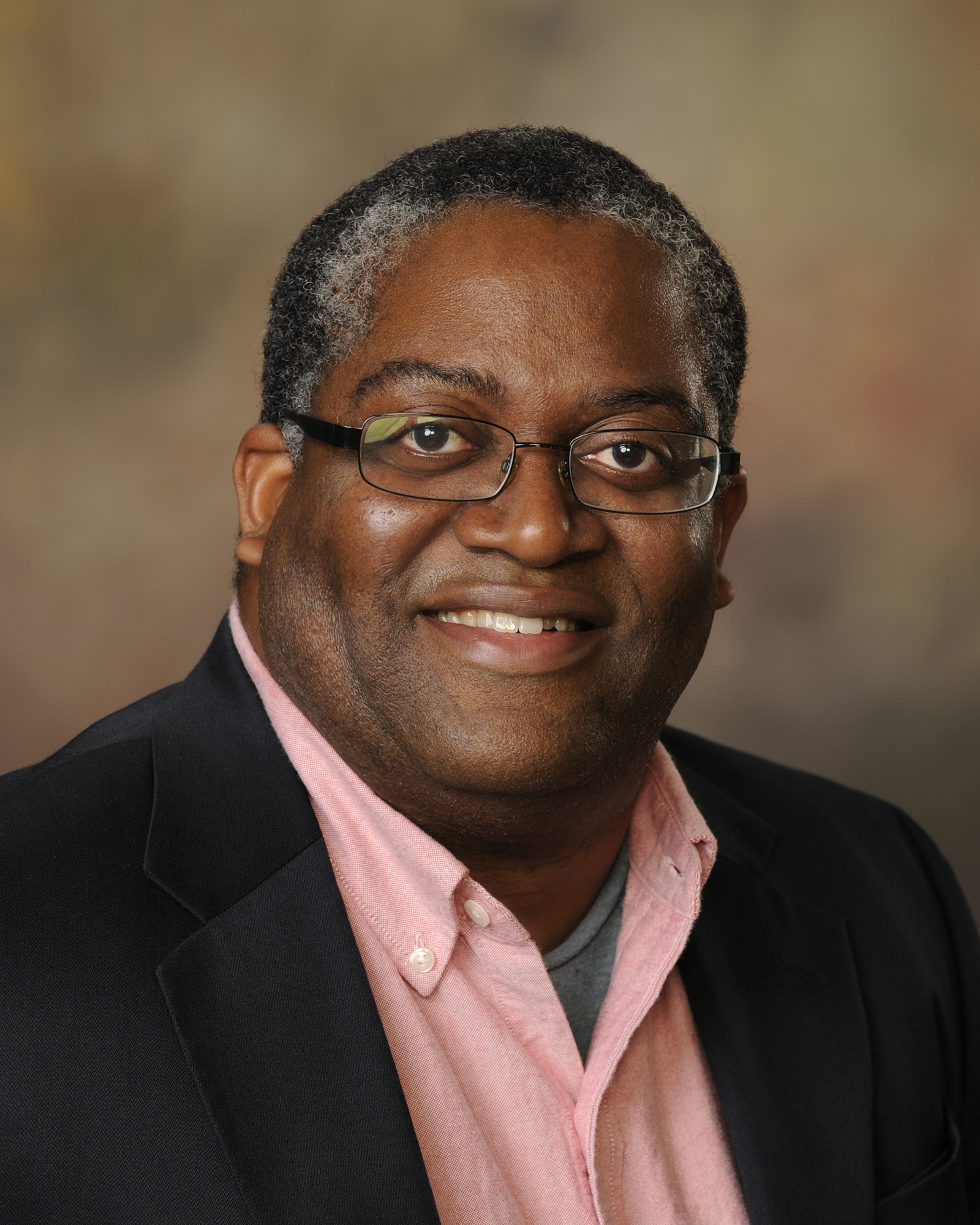
Ed Thomas, Jr.
Categories: Science, Technology, Engineering and Mathematics (STEM)
Hoang earns first NSF CAREER Award for Department of Mathematics and Statistics
Auburn University mathematics professor Thi-Thao-Phuong Hoang hopes to use applied and computational mathematics to help scientists better understand and potentially solve real-world problems like water contamination and climate change, and the department’s first-ever National Science Foundation, or NSF, CAREER Award could help her do exactly that.
“My job is to develop, analyze and implement numerical methods to solve the mathematical models of those real-world physical processes and phenomena,” said Hoang, just the second professor in the state of Alabama to receive an NSF CAREER award in mathematical sciences since it was created in 1995. “I am passionate about interdisciplinary research, and I want to do both the theoretical and practical things, and I find it more motivational when I see the application of my work and how it is used and applied to better understand our world.”
A rising star in Auburn’s Department of Mathematics and Statistics in the College of Sciences and Mathematics, or COSAM, Hoang was notified in February about the historic award that will provide the Vietnam native and her team nearly $440,000 in funding for the next five years. The prestigious honor—administered by the NSF’s Faculty Early Career Development Program—was both humbling and inspiring for Hoang, an assistant professor.
“I’m very excited about it, and it’s a great thing to know all of your hard work has paid off,” said Hoang, winner of the department’s Jack B. Brown Endowed Faculty Award for 2021-23. “You feel very motivated to continue with what you’re working on now that you have the resources and recognition. I am also grateful to my advisors, mentors and collaborators for their constant support and valuable advice.”
Hoang hopes to use the award to recruit and train undergraduate and graduate students, purchase state-of-the-art computer equipment, attend conferences and attract elite-level mathematicians to Auburn for discussions and speaking engagements. By increasing her team’s size and capabilities, Hoang will look to use her expertise in applied and computational mathematics, as well as numerical analysis, on a grander scale to help scientists and colleagues potentially solve real-world environmental problems.
In addition, she will bolster COSAM’s effort to attract and support high school students via the Auburn University Summer Science Institute, or AU-SSI, an educational enrichment program administered by COSAM’s Office of Outreach. It is designed for highly motivated rising 11th- and 12th-grade students from Alabama and Georgia with a high aptitude and interest in pursuing a degree in science, math or a related field.
“As part of the educational component of my CAREER project, I will develop curricular modules in computational mathematics at the AU-SSI to provide young students early exposure to applied mathematics and inspire them, especially girls, to pursue a career in mathematics,” said Hoang, recipient of COSAM’s 2020 Dr. Robert K. Butz Award for Excellence in Teaching.
Hoang earned her bachelor’s in mathematics from Ho Chi Minh City University in her native Vietnam, completed her master’s in applied math at University d’Orleans on Orleans, France, then lived in Paris for nearly four years while she completed her doctorate in applied mathematics from Universite Pierre et Marie Curie. After teaching at her alma mater in Vietnam from 2014-17, she completed a postdoctoral fellowship at the University of South Carolina—where she was part of a team working on a research project about climate and earth system modeling funded by the Department of Energy—before joining the Auburn faculty as a tenured-track professor in 2018.
Fluid dynamics—which provides methods for studying the evolution of ocean currents, weather patterns, plate tectonics and even blood circulation—and how it applies to real-world situations, is an area of interest for Hoang and her team. By designing algorithms to study how the ocean interacts with coasts and the rest of an area’s ecosystem, Hoang hopes to use math to contribute to scientists’ understanding of how the world is changing and the depth and breadth of everyday environmental dilemmas.
“Fluids are everywhere in our world, and I’m [particularly] interested in environmental science,” Hoang said. “So, I’ve been doing nuclear waste repository simulations, where you simulate the transport of radiation nuclides and where they’re buried in the ground. I do ocean modeling, so I simulate the movement of water in the ocean and things like that, water cycles and the interactions between surface and sub-surface flows.”
Hoang also has long-term goals for her research, including streamlining efficiency and accuracy of numerical methods and their parallel implementation.
“My research is Multiphysics and multiscale systems,” she said. “These systems are everywhere and are difficult to simulate correctly. The challenges come from the fact that you have different physics which occur on different spatial and time scales; moreover, they’re coupled together, so there’s some interaction between them which needs to be considered in the simulation.
“Our goal is to develop stable, accurate and efficient numerical methods based on domain decomposition and local time-stepping for solving large-scale Multiphysics multiscale problems.”
Department Chair Ash Abebe has been impressed with Hoang’s work ethic and is excited about what she has brought to Auburn, as well as what her team can achieve in the future.
“Dr. Hoang’s research program, focused on developing novel numerical methods and numerical analysis for partial differential equations, is a very important component of the department's research portfolio,” Abebe said. “Her research has broad applications from transport through porous media, to climate modeling, to solid mechanics and is supported by two concurrent NSF grants she has obtained since coming to Auburn in 2018 and for which she is the sole primary investigator. This award is an indicator of the growing profile of the Department of Mathematics and Statistics as a research leader in the state and the nation.”
Hoang said she and her husband, Tuan, and 6-year-old son, Minh, have thoroughly enjoyed living in Auburn and becoming part of the Auburn Family. She feels the community’s warm and welcoming nature will help provide a great environment for her research work to thrive.
“I think Auburn is such a great place to live, honestly,” she said. “I love being here, and the people around me are all friendly. I can feel the spirit, and so many people with the same interest is really awesome. The COSAM family is great, and I really feel a supportive environment from the people here.
“I feel very lucky.”
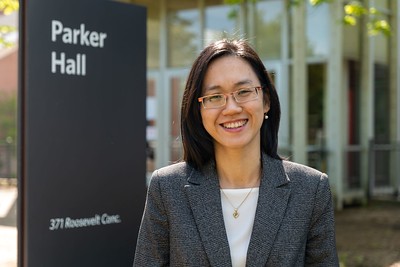
Auburn Assistant Professor Thi-Thao-Phuong Hoang has won the first National Science Foundation CAREER Award in the history of the Department of Mathematics and Statistics. She hopes to use applied and computational math to help solve real-world problems like climate change.
Categories: Science, Technology, Engineering and Mathematics (STEM), Energy & the Environment, Health Sciences
Sixty-three students win awards at ‘Auburn Research: 2021 Student Symposium’
Sixty-three students took home awards for their research and creative scholarship posters and oral presentations during the recent, virtual “Auburn Research: 2021 Student Symposium.” Nearly 350 undergraduate and graduate students from Auburn and Auburn Montgomery participated in the annual symposium, which gives students an opportunity to share their work university-wide and with the general public.
Undergraduate Research Awards
The undergraduate first-place award in the Science, Technology, Engineering and Mathematics poster presentations went to Anna Solomonik of Drug Discovery and Development. Shalom Kim of AUM Chemistry and Biochemistry captured first place in the STEM oral presentations.
In the category for Human Sciences, Social Sciences, Creative Arts, Nursing and Humanities, Sally Ann Missildine of Interior Design won first place for her poster presentation, while Stanley Wijaya of Nutrition, Dietetics and Hospitality Management took first in the oral presentations.
Graduate Research Awards
The graduate first-place winner for the Science, Technology, Engineering and Mathematics poster presentations was Manjusha Annaji of Pharmaceutical Sciences, while first place in the STEM oral presentations went to Kaelyn Fogelman of Fisheries, Aquaculture and Aquatic Sciences.
In the category for Human Sciences, Social Sciences, Creative Arts, Nursing and Humanities, Kassandra Ross of Consumer and Design Sciences won first place in the poster presentations, while Juliana Parma of Kinesiology captured first in the oral presentations.
College-specific awards were also presented for undergraduate and graduate student categories. A complete list of winners, as well as titles of their projects, is available on the “Auburn Research: 2021 Student Symposium” website.
![orange and blue background graphic: Auburn Research: A Showcase of Research and Creative Scholarship Student Symposium 2021 Virtual Event march 29-April 2 [Auburn University logo]](https://cws.auburn.edu/shared/files?id=159&filename=RSRH%20-%202021%20Student%20Research%20Symposium%20Social%20Media%20Graphics_TW.jpg)
Sixty-three students have won awards for their research presentations given during the Auburn Research: Student Symposium 2021 virtual event held March 29 through April 2.
Categories: Science, Technology, Engineering and Mathematics (STEM), Health Sciences, OVPRED, Creative Scholarship, Life Sciences, Undergraduate Research, Agriculture
Auburn University senior named Barry M. Goldwater Scholar
Auburn University senior Shelby Wales is now a Barry M. Goldwater Scholar, an honor bestowed on only 410 students nationwide this year. The scholarship is widely considered the most prestigious award in the United States for undergraduates in science, technology, engineering and mathematics.
Wales, originally from Sylacauga, Alabama, is majoring in chemical engineering in the Samuel Ginn College of Engineering and minoring in supply chain management in the Raymond J. Harbert College of Business. Wales was chosen from a field of more than 5,000 college students.
Her research investigates different pathways of implementing 3D printing to investigate geochemical reactions. Wales hopes that, by producing 3D printing models of real rock structures that possess the same reactive properties, further insight may be obtained about the geochemical reactions that occur in conjunction with carbon capture and sequestration.
“I think the community of Goldwater Scholars I have already been connected to will be immensely helpful as I continue learning and begin my career,” Wales said. “I am incredibly honored to have been selected for this scholarship, and I hope it will put me in a position to continue doing work I enjoy with incredible people.”
While Wales spends multiple hours in the lab, she also finds time to participate in a variety of campus organizations, as well as win numerous accolades for her academic success. She was awarded the 2020-21 Undergraduate Research Fellowship; is a member of Alpha Omega Epsilon, Omega Chi Epsilon and Tau Beta Pi honors societies; and has made the Samuel Ginn College of Engineering Dean’s List multiple times.
“I feel so fortunate for the support of peers, mentors and family that surround me,” Wales said. “The Goldwater Scholarship is an individual award, but I have not been alone throughout my undergraduate and research experience.”
Wales noted that Assistant Professor Lauren Beckingham in the Department of Civil and Environmental Engineering has supported her research interests and personal academic journey from the time Wales joined Beckingham’s research group in spring 2019.
“The open, collaborative environment fostered in our research group has been formative toward my perception of the value of scientific research,” Wales said.
During Wales’ internship with Southern Company, Nick Irvin, director of research and development, strategy, advanced nuclear and crosscutting technology, and Lauren Lathem, principal research engineer, continuously prompted her to be intentional and objective when conducting research.
“Their guidance has allowed me to think creatively about the way research is conducted, so that the best solution, or the right solution, can be found,” Wales said.
Alex Sauer, fellowship advisor for Auburn’s National Prestigious Scholarships Program and the Goldwater campus representative, said, “The Goldwater Scholarship is the preeminent undergraduate award of its type in the fields of mathematics, the natural sciences and engineering. We look forward to great things from Shelby and commend her faculty mentors for the pivotal role they have played in her success.”
The Barry M. Goldwater Scholarship Program was established to provide scholarships to outstanding students who intend to pursue careers in mathematics, natural sciences and engineering. Each scholarship covers eligible expenses up to a maximum of $7,500 annually for undergraduate tuition, fees, books and housing.
In awarding scholarships, the foundation considers the nominee's field of study and career objectives, along with the extent to which that individual has the commitment and potential to make a significant contribution to the field of science or engineering.
The National Prestigious Scholarship office at Auburn University, located in the Honors College, works closely with students to identify and help them pursue prestigious scholarships and other national and international awards through informational sessions and one-on-one support during the application process. For more information, contact Alex Sauer at ras0046@auburn.edu.
BY WADE BERRY
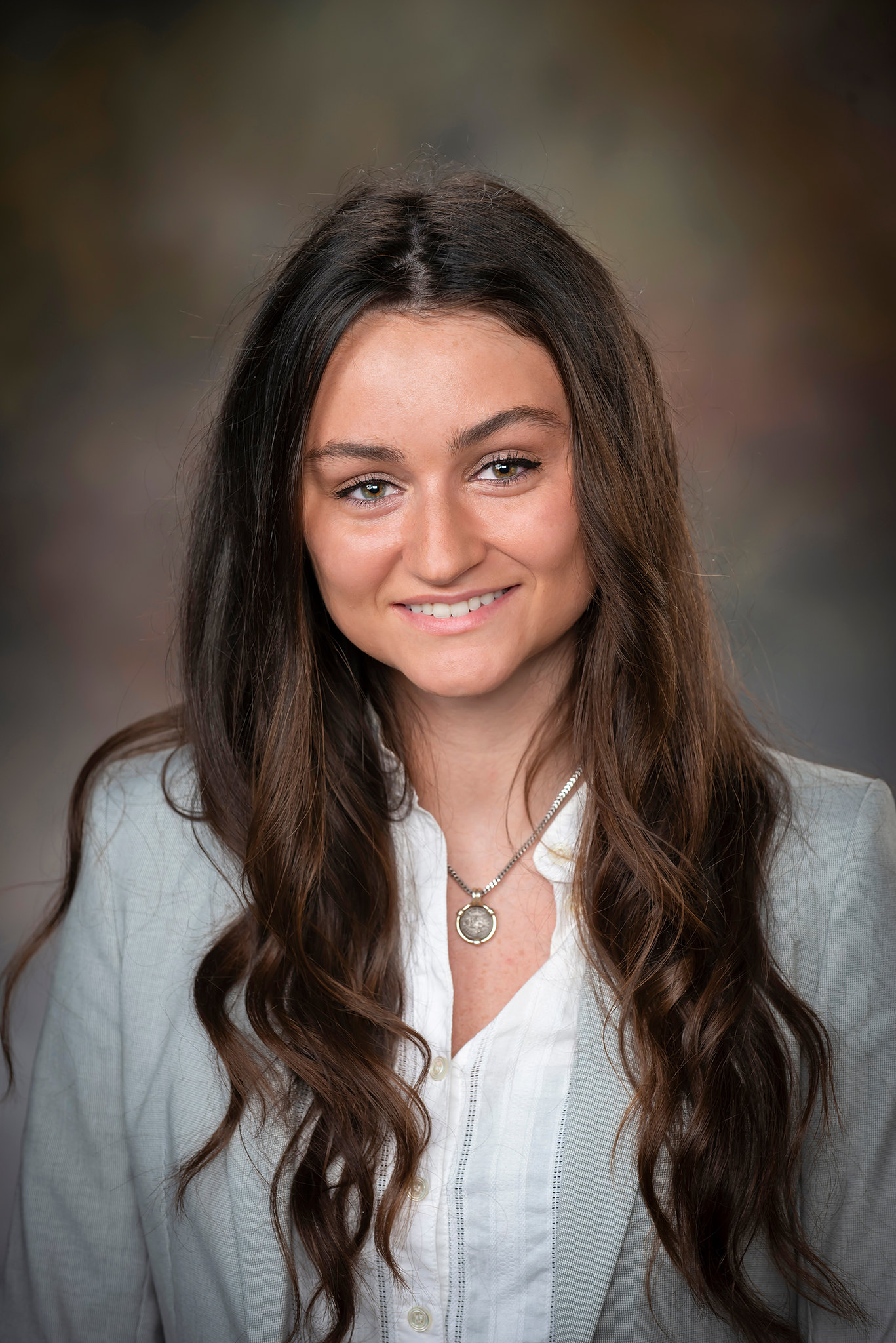
Auburn University senior Shelby Wales is now a Barry M. Goldwater Scholar, an honor bestowed on only 410 students nationwide this year.
Categories: Science, Technology, Engineering and Mathematics (STEM), Engineering, Auburn In the News, Undergraduate Research
Auburn Research: Student Symposium virtual event set for March 29-April 2, offers showcase of student research, creative scholarship
Although the presentation format is virtual, this year’s “Auburn Research: Student Symposium” offers Auburn University and Auburn University Montgomery students a unique venue for showcasing their research and creative scholarship to a broad audience. More than 350 student presentations are expected for the symposium, which runs March 29-April 2.
“Undergraduate and graduate students will be making oral, poster and creative scholarship presentations,” said Lorraine Wolf, director of undergraduate research and organizing member of the Auburn Research Symposia Committee. “Students from all disciplines will participate.”
This year’s event, instead of the typical live presentations, is being conducted virtually. Podium presentations will be delivered live via Zoom, with presenters assigned a specified time. Poster presentations will be prerecorded, but opportunities for feedback and interactions will be provided.
“The student symposium is envisioned as an opportunity to share student discoveries and creative scholarship with a broad audience consisting of faculty, staff, graduate and undergraduate students and the public,” Wolf said. “In addition, students can compete for several awards, with prizes ranging from $50 to $500.”
More information about the event can be found on the Auburn Research: Student Symposium website. Undergraduate students with questions should contact Wolf at undgres@auburn.edu. Graduate students should direct questions to Sara Schiller at sgs0025@auburn.edu.
“Even though we are having to conduct this year’s symposium online, it still offers students a unique opportunity for presenting their work,” Wolf said. “Despite the challenges of the past year, our students are actively involved in cutting-edge research on a broad range of socially, culturally and scientifically relevant topics, and we believe there will be substantial interest, just as in the years previous.”
BY MITCH EMMONS
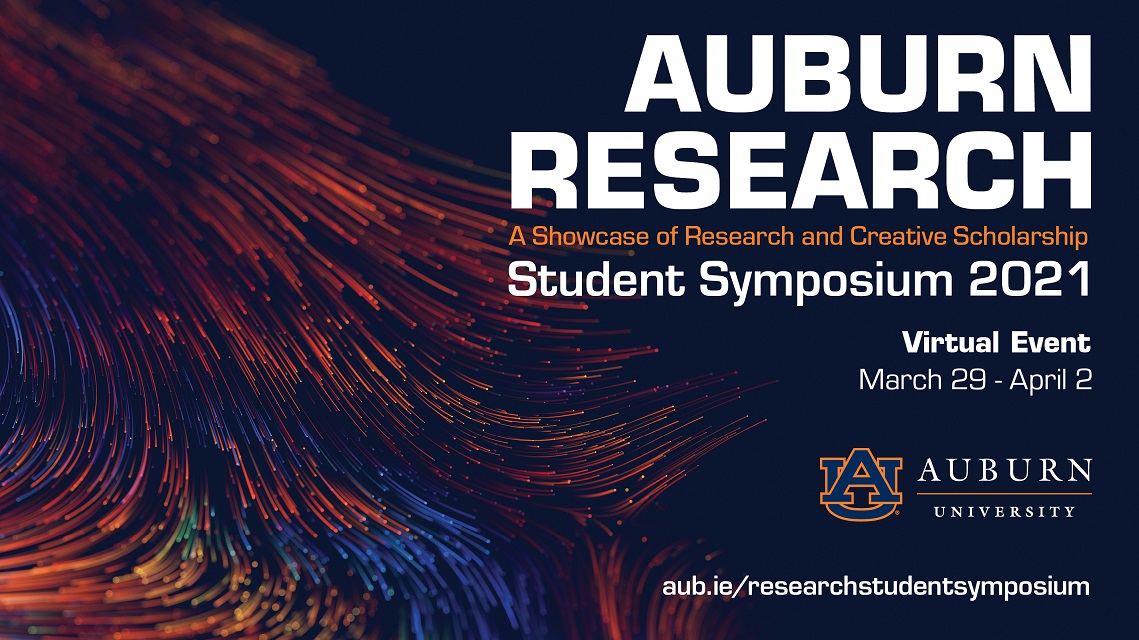 The 2021 Auburn Research: Student Symposium is set for March 29-April 2.
The 2021 Auburn Research: Student Symposium is set for March 29-April 2.
Categories: Science, Technology, Engineering and Mathematics (STEM), Creative Scholarship, Undergraduate Research
Pair of Auburn graduate students awarded prestigious National Science Foundation Graduate Research Fellowships
Two graduate students in Auburn University’s College of Sciences and Mathematics have been awarded Graduate Research Fellowships by the National Science Foundation, or NSF.
Akilah Alwan and Victoria Coutts have been awarded fellowships that provide up to three years of support for graduate education, including a $34,000 annual stipend and $12,000 per year toward the cost of their graduate work. The NSF Graduate Research Fellowship program receives more than 12,000 applications each year and selects about 2,000 students.
Alwan, a doctoral student in the Department of Geosciences, is conducting research in a project focused on science, technology, engineering and mathematics, or STEM, and learning. Coutts, a doctoral student in the Department of Biological Sciences, is pursuing a project in physiology.
As the oldest graduate fellowship of its kind, the NSF Graduate Research Fellowship Program has a long history of selecting recipients who achieve high levels of success in their future academic and professional careers. The program recognizes and supports outstanding graduate students in NSF-supported science, technology, engineering and mathematics disciplines who are pursuing research-based master's and doctoral degrees at accredited United States institutions. Numerous Auburn graduate students have been awarded fellowships through the program the past 20 years.
The reputation of the fellowship follows recipients and often helps them become lifelong leaders who contribute significantly to both scientific innovation and teaching. Past fellows include numerous Nobel Prize winners; U.S. Secretary of Energy Steven Chu; Google founder Sergey Brin; and Freakonomics co-author Steven Levitt. In addition to funding support, fellows also enjoy opportunities for international research and professional development.
BY MITCH EMMONS
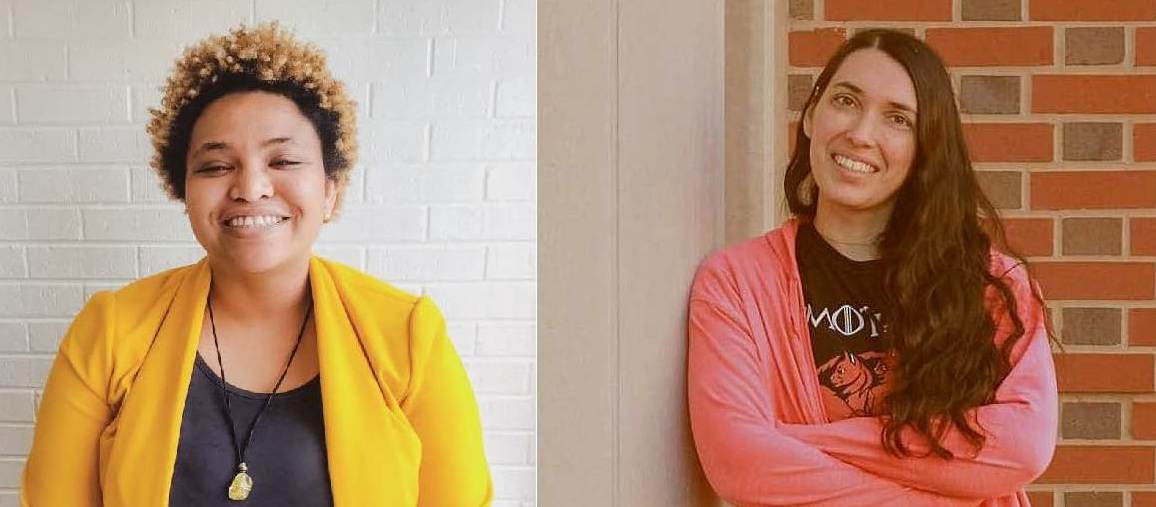
Akilah Alwan (left), a doctoral student in Auburn’s Department of Geosciences, and Victoria Coutts, a doctoral student in Auburn’s Department of Biological Sciences, have received Graduate Research Fellowships from the National Science Foundation.
Categories: Science, Technology, Engineering and Mathematics (STEM), Life Sciences
NSF CAREER Award helps Auburn chemist study materials that could power tomorrow’s consumer electronics
Evangelos Miliordos is investigating new materials that can help power tomorrow’s consumer electronics.
Miliordos, an assistant professor in the Department of Chemistry and Biochemistry, focuses his research in computational chemistry through the Miliordos Research Group. He has received a $558,375 NSF CAREER award to develop calculations that can lead to a novel class of super-atoms with real-world applications of batteries, solar cells, catalysis and quantum computing.
Over the next five years, his work will apply the principles of quantum mechanics to understand the theoretical properties of metals and ammonia.
“I am trying to create an exciting new material formed through metal atoms dissolved in liquid ammonia,” explained Miliordos. “The metal atom and the ammonia molecules form a combined structure where the molecules act like a single, super-sized atom.”
His work has an outreach component to teach high school students more about these chemical concepts, properties and structures.
“My project will focus on the performance of high-level electronic structure calculations of the transition metals with a number of ammonia, amine, polyamine or other ligand,” he added. “It will give me an opportunity to explore new types of chemical bonds and study materials that can facilitate chemical reactions pertaining to catalysis and can be used in quantum computing.”
This NSF CAREER award is funded by the Chemical Structure Dynamics and Mechanisms (CSDM-A) program of the Chemistry Division.
BY MARIA GEBHARDT
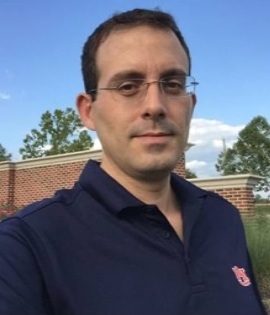
Evangelos Miliordos
Categories: Science, Technology, Engineering and Mathematics (STEM), Energy & the Environment
Auburn researcher receives $1.9 million grant for rapid immune diagnostics
An Auburn Engineering faculty member has received a $1.9 million National Institutes of Health grant – the largest NIH grant the Samuel Ginn College of Engineering has ever received.
The grant will support Pengyu Chen, assistant professor of materials engineering, in his project to develop next-generation, rapid diagnostic tools for the health care industry.
For doctors, having real-time data on the health and function of a patient’s immune system is critical to treating cancer and autoimmune diseases. However, one of the main diagnostic tools in use today, the enzyme-linked immunosorbent assay, must be sent to a lab and takes hours to days for results to return.
By then, the dynamics of the immune system may have completely changed, leaving the clinician to make treatment decisions based on outdated information.
Chen is aiming to change that by developing optofluidic nanoplasmonic biosensors for rapid analysis of the immune system. The research study seeks to better understand and measure cytokines – tiny proteins vital to signaling between cells – for rapid diagnostics.
“The ultimate goal is to develop a biomedical device based on nanoparticles that we can use to take one droplet of the patient’s blood and, in a short period of time, we can accurately tell if the patient’s immune system is healthy or not,” Chen said.
The research project has three primary goals: to integrate nanoplasmonic structures into biosensors for higher performance and faster response time; to fabricate microfluidic devices for target cell isolation and on-chip measurements and analysis; and to develop nanoplasmon ruler biosensors – two nanoparticles linked with one DNA – to visualize cytokines secreted from a single immune cell and eventually map out its secretion profile. Previous research suggests that measuring cytokine-based immune fingerprints provides useful information related to infectious diseases, cancer and other diseases.
“We are trying to provide real-time feedback of the immune system for personalized immunomodulatory therapies,” Chen said. “Currently, there is no technology that can serve as a real-time diagnostic tool to tell if the dosage and timing of a therapy is good or not. Our hope is that we can develop a point-of-care technology that can be used at bedside so that physicians can make decisions based on these measurements more quickly and accurately, and then potentially change the outcome of the therapeutics.”
The grant is funded through the NIH’s R35 Maximizing Investigators' Research Award for Early Stage Investigators program. The five-year grant will allow Chen to hire up to three doctoral students and two postdoctoral researchers to assist with the study.
BY CHRIS ANTHONY
WEB.jpg)
Pengyu Chen, PhD, assistant professor of materials engineering
Categories: Science, Technology, Engineering and Mathematics (STEM), Health Sciences
Auburn University achieves research milestone with ‘R1’ Carnegie classification
In another affirmation of its drive forward to excellence, Auburn University achieved a research milestone Monday - being elevated to an “R1” institution by the Carnegie Classification of Institutions of Higher Education.
The announcement follows a concerted effort by Auburn to elevate its commitment to life-saving research, beginning with an announcement by Auburn President Steven Leath in December 2017 and subsequent awarding of $5 million for three years toward the Presidential Awards for Interdisciplinary Research, or PAIR. An R1 designation by Carnegie is reserved for doctoral universities with the highest levels of research activity.
Among 120 institutions to receive the R1 designation Monday, Auburn was listed in the top 100 of such universities, raising its classification from an already lofty “high research” R2 classification to Monday's “very high research activity” R1 label.
“This tremendous designation acknowledges the hard work involved in the pioneering discoveries happening at Auburn every day,” said Leath, who was recently named one of seven new members appointed by President Trump to the National Science Board, a policy-making body of the National Science Foundation. “We are grateful to the university’s faculty and staff, especially Graduate School Dean George Flowers, for their unwavering commitment to elevating Auburn’s profile as a world-class academic institution.
“Auburn is on the move, and this prestigious distinction recognizes Auburn’s critical role in creating new knowledge and helping others live better lives.”
Universities considered for the R1 designation must have awarded at least 20 research/scholarship doctoral degrees and had at least $5 million in total research expenditures, according to Carnegie’s classification website. Auburn has grown its research efforts in both STEM and non-STEM areas, furthering its institutional commitment to offer solutions to real-world problems and grow its reputation as a go-to university in providing results that transform and inspire.
“Auburn University is known for its innovative and transformational research, and receiving the R1 classification is a significant accomplishment,” said Jennifer Kerpelman, interim vice president for research. “This classification recognizes the dedication, commitment and hard work of Auburn’s faculty and student researchers across all disciplines.”
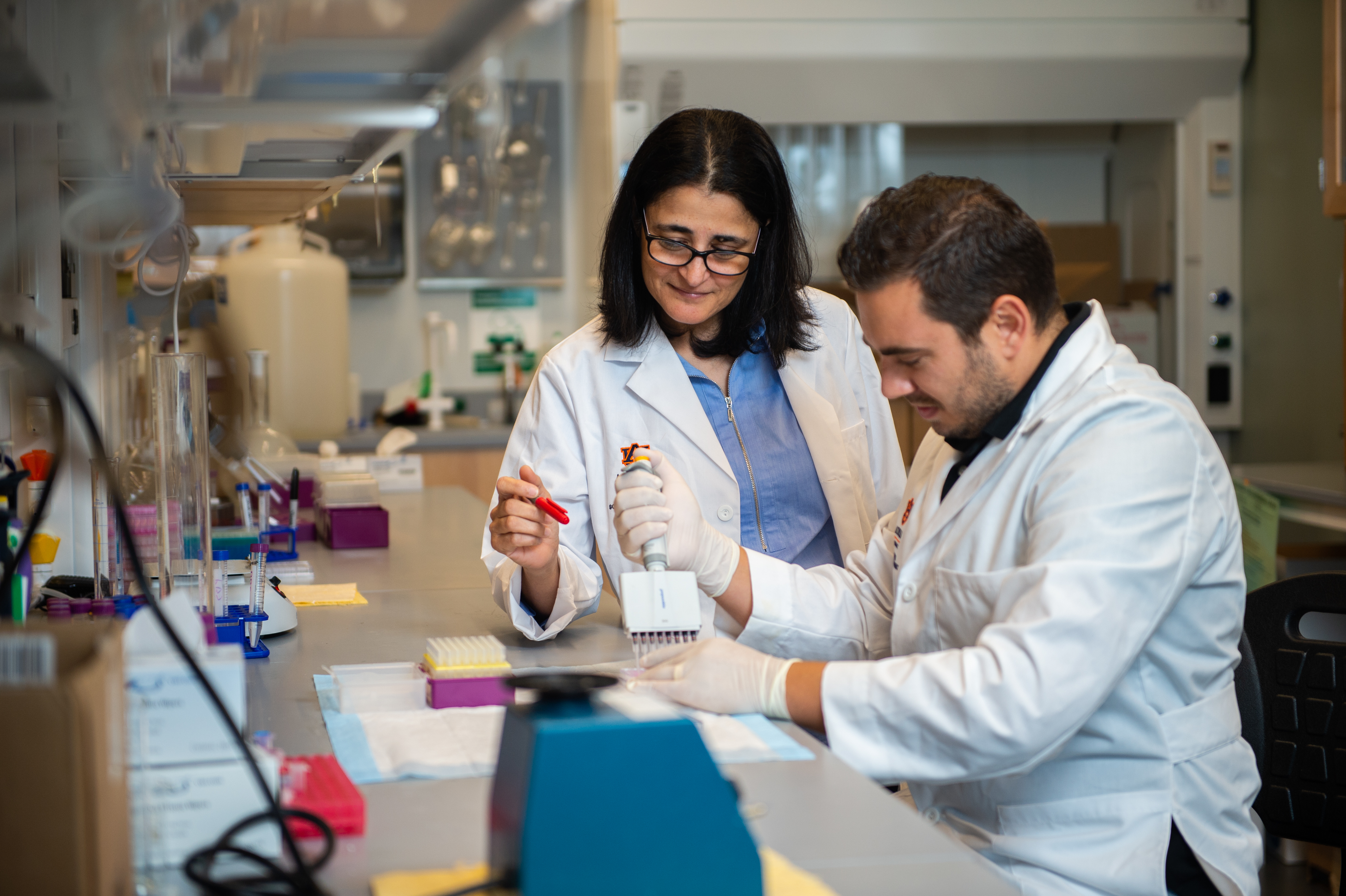
Dr. Amal Kaddoumi, left, a professor in Auburn’s Department of Drug Discovery and Development, works in a lab with graduate research assistant Sweilem Al Rihani. Kaddoumi is leading a multi-disciplinary team in an investigation of oleocanthal, a molecule that appears naturally in extra-virgin olive oil, as a novel preventative treatment for such diseases as Alzheimer’s or dementia.
Categories: Science, Technology, Engineering and Mathematics (STEM), Cyber, Energy & the Environment, Health Sciences, Transportation, Food Systems, Engineering, Auburn In the News, Creative Scholarship
Presidential Awards for Interdisciplinary Research (PAIR) Announced
Auburn research teams are tackling local and global challenges ranging from housing affordability to advanced manufacturing of medical implants, thanks to a new $5 million investment in 11 groundbreaking projects designed to deliver practical, life-changing solutions.
“Auburn research is on the move,” said Auburn President Steven Leath. “Our world-renowned faculty are leading Auburn in our drive to solve problems, provide real-world benefits and serve the social good.”
Today’s announcement is part of an initiative funded through the Presidential Awards for Interdisciplinary Research, or PAIR, that Leath created last year to propel Auburn to new levels of research and development distinction. The PAIR funding will span three years. Additional research topics include rural health disparities in poverty-stricken areas, treating the hallmarks of Alzheimer’s disease, neuroscience research and graduate education, reducing carbon dioxide emissions or using them for other means, and other critical areas of human and environmental health.
Project teams were selected from three award tiers: Tier 1 for new teams, with funding up to $100,000 per year; Tier 2 for established teams, with funding up to $250,000 per year; and Tier 3 for high-impact teams, with funding up to $500,000 per year. All proposals received an in-depth evaluation from Auburn’s associate deans for research, and Tier 3 proposals were also externally evaluated. Top-evaluated proposals were those that most closely aligned with the goals of PAIR as stated in the program guidelines. From 101 proposals received, 11 project teams will receive funding (the two top-evaluated proposals per tier for up to three years of funding, as well as five additional, top-evaluated Tier 1 proposals for two years of funding with a third-year no-cost extension available).
Project teams to receive funding are:
Project: Creating better bio-medical implants for patients in need using additive manufacturing, or “3D Printing” (Tier 3; $1,275,000 total funding over three years)
The issue: Auburn researchers plan to develop improved implants/orthotics for those with neuromuscular and skeletal system needs through the process of additive manufacturing. This process, also known as “3D printing,” allows for more customizable implants for small animals and humans and the possibility of embedded drugs in implants to ward off infections that can sometimes follow implant surgeries.
The Auburn solution: Research will take place to ensure “3-D printed” biomedical implants will remain durable during use and conform well to a patient’s needs while serving as a reliable drug-delivery source that can offer injury-triggered pain relief. The additive manufacturing process also helps reduce implant production costs.
Project: Unlocking Home Affordability and Prosperity in Rural America (Tier 3; $1,275,000 total funding over three years)
The issue: Auburn researchers are focusing on helping those in poor, rural areas gain greater access to resources that will ultimately lead them to finding affordable housing options.
The Auburn solution: Auburn researchers will work toward the creation of a National Institute of Rural Prosperity that will foster partnerships to help rural residents more easily overcome barriers to home ownership, including mortgage lending, home insurance and local ordinances and policies.
Project: Reducing the burden of neurological disease by increasing fundamental knowledge about the brain and nervous system (Tier 2; $637,500 total funding over three years)
The issue: Auburn researchers will work to mitigate against mental, neurological and substance use disorders, which make up a substantial proportion of the world’s disease burden.
The Auburn solution: A team of experts in chemistry, physiology, development, degeneration, and imaging of the brain will collaborate to develop a neuroscience center to increase fundamental knowledge about the brain and nervous system and to use that knowledge to reduce the burden of neurological disease.
Project: A Mobile Mitochondria Laboratory (AU MitoMobile) to Lead the World in Measuring Bioenergetics in Natural Settings (Tier 2; $636,941 total funding over three years)
The issue: Because the successful study of genetic and environmental impacts on mitochondria (the energy-providing part of the cellular makeup of plants and animals) can be severely limited in a laboratory setting, Auburn researchers will collaborate to build a mobile laboratory to bring this research to field sites.
The Auburn solution: A team of evolutionary biologists, environmental biologists, exercise physiologists and engineers will develop a mobile laboratory for measuring mitochondrial energy production of vertebrates at remote locations, such as oil spill sites and other places where environmental disturbances have damaged the health of local wildlife.
Project: Rural African American Aging Research (Tier 1; $255,000 total funding over three years)
The issue: Auburn researchers will assess the psychosocial stressors that can contribute to the problem of rural African Americans having a lower life expectancy and a faster progression of age-related diseases. Research in this area has the potential to inform health-promoting interventions and polices and lead to health and social equity.
The Auburn solution: PAIR funding will be used to establish a sustainable research structure in east-central Alabama focused on improving health in that community and beyond by partnering with surrounding communities. The ultimate goal is to grow the scientific knowledge of how psychosocial risk factors can accelerate aging among African Americans.
Project: Reducing and reusing carbon dioxide emissions for useful means (Tier 1; $255,000 total funding over three years)
The issue: Auburn researchers seek to combat the dire environmental effects of carbon dioxide emissions through a plan to reduce such emissions and store or utilize them for other useful means.
The Auburn solution: Researchers will work toward the development of an Alabama CO2 Utilization and Storage Center at Auburn University, with a goal of establishing Auburn as a leader in carbon dioxide utilization and storage research focused on best ways to capture CO2 emissions and convert them into helpful forms such as green fuels.
Project: Extra-virgin olive oil examined for uses in treating hallmarks of Alzheimer’s (Tier 1; $150,000 total funding over two years)
The issue: Auburn researchers are examining the consumption of extra-virgin olive oil for its potential to have a positive effect on the disease hallmarks of Alzheimer’s Disease. The research team is seeking to conduct more research into this area to determine the viability of findings for humans.
The Auburn solution: A multidisciplinary team will be assembled to conduct a pilot study on the positive effects of extra-virgin olive oil and to produce data for a strong human clinical trial to be submitted to funding agencies.
Project: Drugs from Dirt: Development and Characterization of Novel Antimicrobial Compounds (Tier 1; $150,000 total funding over two years)
The issue: Because many disease-causing organisms are resistant to current drug therapies, Auburn scientists are pursuing new approaches to the development of antibiotics.
The Auburn solution: Researchers will test and develop new therapeutic strategies for treating infectious diseases, through the study of antiobiotic-producing bacterial cultures they have discovered in soil. These are potentially life-saving antibiotics that could have application in human medicine, agriculture, and veterinary practice.
Project: Creating a Climate Information System to aid in planning for climate-related disasters (Tier 1; $150,000 total funding over two years)
The issue: Auburn researchers will create a climate service model that will help guide decision making in planning for climate-related disasters that can cause great economic and social damage.
The Auburn solution: A cross-disciplinary team of investigators will develop a science-based, Unified Climate Information System to better inform planning, policy and practices at regional, national and global scales. In addition to exploring emerging climate data, the research will seek to improve and integrate impact models for water quantity, water quality, crop growth and disease transmission simulations. The project also will include the creation of an interactive website platform, with all work being focused on the southeastern U.S. and being easily adaptable to other locations worldwide.
Project: Emerging Contaminants Research Team (Tier 1; $150,000 total funding over two years)
The issue: Auburn experts are conducting research into newly recognized environmental contaminants, such as per- and polyfluoroalkyl substances, which have not been studied sufficiently to determine their impact on the environment and their possible health risks to humans and wildlife.
The Auburn solution: This Auburn research team will use its expertise in civil engineering, pharmacology, aquatic sciences, and other key areas to collaborate on focused research into the effects of these and other previously understudied contaminants, to increase knowledge and public awareness of risk factors.
Project: Development of the AU-NASH Research Program (Tier 1; $150,000 total funding over two years)
The issue: Auburn researchers are seeking solutions to the problem of nonalcoholic steatotic hepatitis, or NASH, the most severe form of non-alcoholic fatty liver disease and perhaps the most significant form of chronic liver disease in the world today, which has no current approved therapies available.
The Auburn solution: The research team will work to address this urgent, unmet medical need by developing a disease therapy program to increase positive outcomes for those suffering from liver disease.
For more details on each PAIR project and how Auburn is inspiring as a leading provider of life-changing research, creative scholarship and community engagement, visit auburn.edu/auburninspires.
BY JONATHAN CULLUM AND PRESTON SPARKS
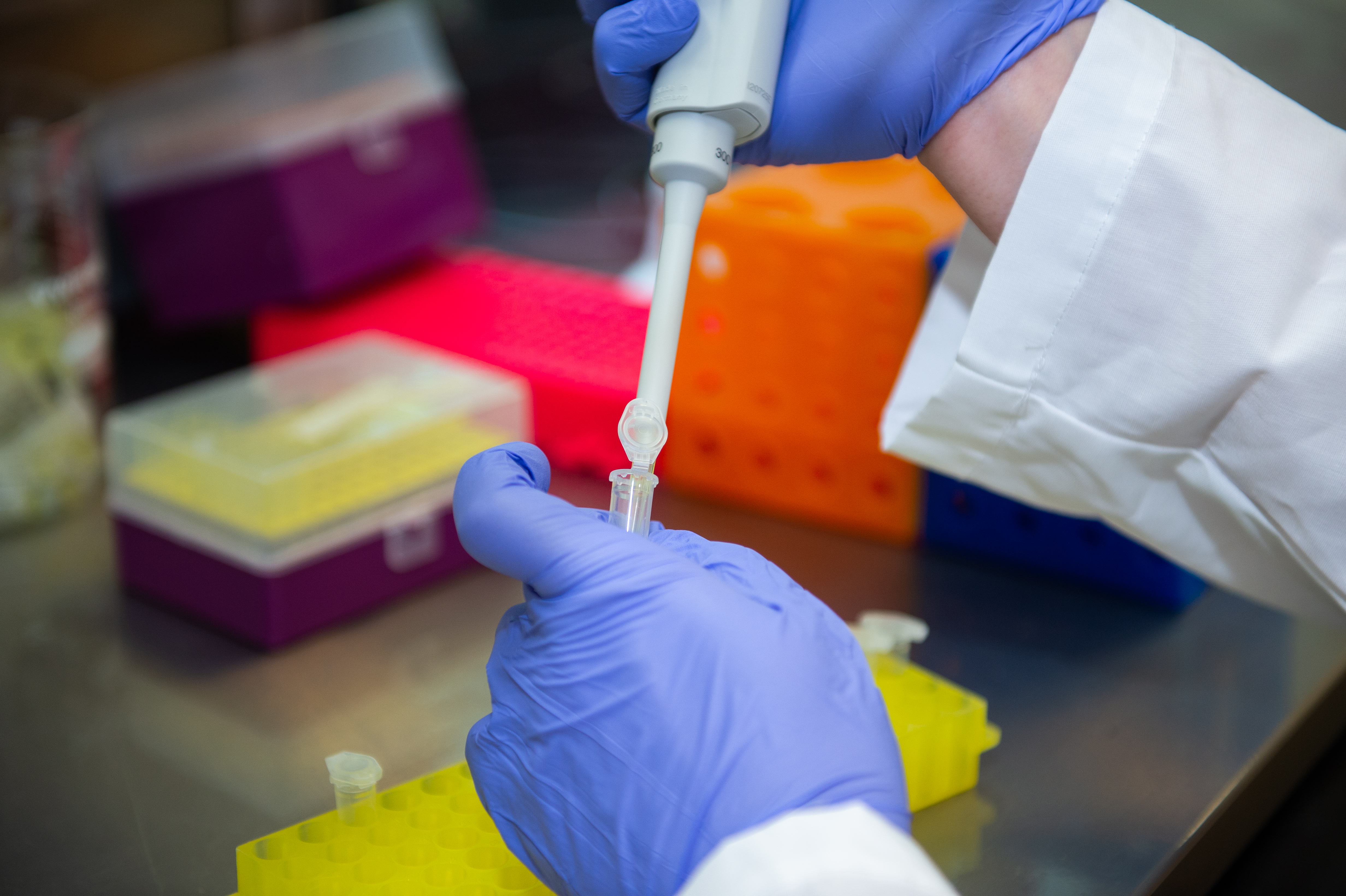
Categories: Science, Technology, Engineering and Mathematics (STEM), Energy & the Environment, Health Sciences, Food Systems, Engineering
Thomas honored for research on black women in computing
Jakita Thomas, Philpott-WestPoint Stevens Associate Professor in the Department of Computer Science and Software Engineering, was awarded a Best Paper Award at the 2018 conference for Research on Equity and Sustained Participation in Computing, Engineering and Technology.
The paper, “Speaking Truth to Power: Exploring the Intersectional Experiences of Black Women in Computing,” examined the experiences of 11 black women in computer science.
Thomas’ research found that these women experienced discrimination, unrealistic expectations from others, isolation, sexism and racism, but despite these obstacles, they stayed committed to the computing discipline. These women continued in the field by remaining true to their personal and professional goals, having effective mentors and inspiration from their fathers, according to the study.
“Improving diversity in computing is an important initiative right now,” said Hari Narayanan, chair of the Department of Computer Science and Software Engineering. “Dr. Thomas’ research in this area is crucial because it examines why black women persist in computing, rather than why they leave the field. Her work will help identify ways to encourage and retain talented students from underrepresented groups in our field.”
Co-authors of the paper include Nicole Joseph of Vanderbilt University, Arian Williams of Mississippi Valley State University, Jamika Burge of Capital One and Auburn computer science graduate Chan’tel Crum.
Thomas joined the Auburn Engineering faculty in 2016 after a six-year stint on the faculty at Spelman College. She began her career as a researcher at IBM Research – Almaden. Thomas is also the recipient of a National Science Foundation CAREER Award and a Presidential Early Career Award for Scientists and Engineers.
BY CHRIS ANTHONY
Media Contact: Chris Anthony, chris.anthony@auburn.edu, 334.844.3447
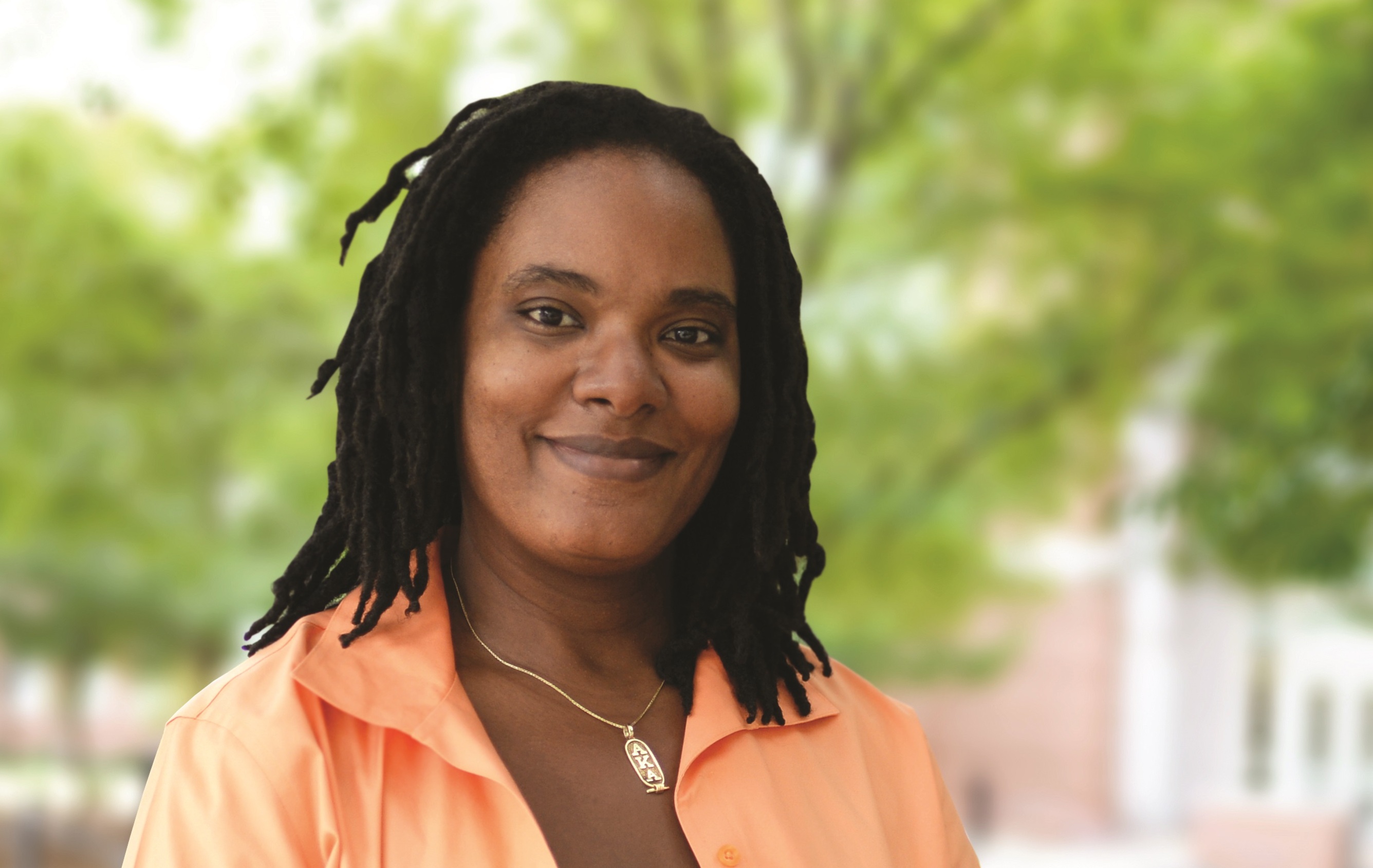
Dr. Jakita Thomas
Categories: Science, Technology, Engineering and Mathematics (STEM)
Auburn Engineering faculty participating in NSF’s STEM for All Video Showcase
Alice Smith and Jeff Smith, faculty members in the Department of Industrial and Systems Engineering, are featured in the 2018 STEM for All Video Showcase funded by the National Science Foundation. The event is being held online through May 21 at stemforall2018.videohall.com.
The presentation, entitled “NASA Academy of Aerospace Quality,” highlights work conducted by the two faculty members to create an open-access Internet-based quality assurance training platform for those involved in aerospace research, technology development and space payload design and development. The project is funded by NASA.
“NASA AAQ is an innovative platform that teaches critical aspects of quality engineering and quality assurance through 50 educational modules available to academics, students and commercial space service providers,” said Alice Smith, the Joe W. Forehand/Accenture Distinguished Professor.
Now in its fourth year, the annual showcase will feature more than 200 innovative projects aimed at improving STEM learning and teaching, which have been funded by NSF and other federal agencies. During the weeklong event, researchers, practitioners, policy makers and members of the public are invited to view the short videos, discuss them with the presenters online and vote for their favorites.
The theme for this year’s event is “Transforming the Educational Landscape.” Video presentations cover a wide range of topics including science, mathematics, computer science, engineering, cyberlearning, citizen science, maker spaces, mentoring, informal learning, professional development, research and evaluation, Next Generation Science Standards and the Common Core. The videos highlight initiatives for students of all ages - kindergarten through graduate school, as well as those for adult learners.
Last year’s STEM for All Video Showcase is still being accessed, and to date has had more than 51,000 unique visitors from more than 189 countries.
BY ENGINEERING COMMUNICATIONS AND MARKETING STAFF
Media Contact: Chris Anthony, chris.anthony@auburn.edu, 334.844.3447
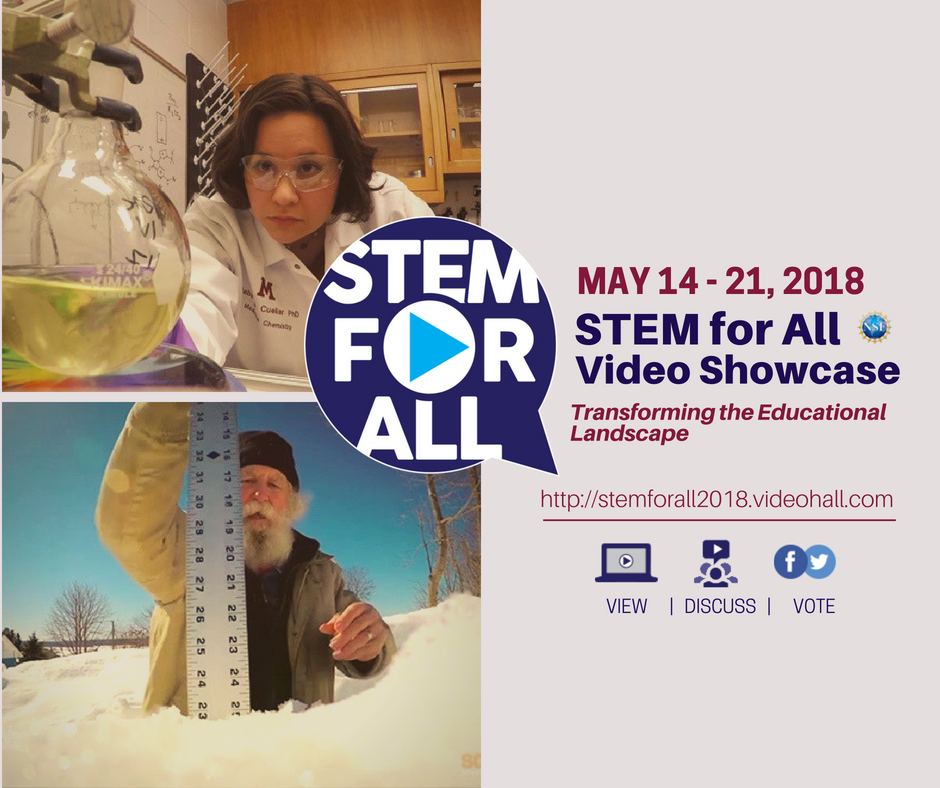
Categories: Science, Technology, Engineering and Mathematics (STEM)
BEST Robotics program catapults high school students to presidential science fair
Three Wetumpka High School students who participated in the Auburn University-sponsored BEST Robotics outreach program were selected to travel to Washington, D.C., for the 2015 White House Presidential Science Fair as honored guests.
The high school's BEST Robotics team leaders, Zena Banker, Ernald Jules Aloria and Joshuah Noel, represented the team at the White House and stood behind President Barack Obama during a broadcast address in which he elaborated on the importance of science education. The students also interacted with the president, as well as peers from across the nation, engineers, scientists like Bill Nye, high-level senior government officials, private sector representatives and others.
Wetumpka High School is the only BEST Robotics team in the nation to receive an invitation to participate in the 2015 White House Presidential Science Fair.
The students traveled to Washington, D.C., as representatives of Friends of BEST in Alabama, a not-for-profit organization formed in Alabama to provide additional resources supporting education and workforce development.
"When Friends of BEST in Alabama was informed of our invitation to the White House, there was no other team more deserving than Wetumpka," said Robin Fenton, director of Friends of BEST in Alabama.
The three student representatives were selected by Friends of BEST in Alabama to participate in the science fair based on their performance with BEST Robotics, as well as a written essay.
Banker, who also was invited to participate in an exclusive women's roundtable discussion at the White House, wrote an essay about her early childhood spent in foster care due to biological parents who were addicted to alcohol and drugs. She described how her life changed for the better at age 6 when she was adopted. Once a shy young lady without strong friendships, she detailed in her essay how her blossoming interest in science has led to both respect from her peers and new friendships.
"I wasn't exactly the smartest kid when I was in middle school, and other kids made fun of me because of it," said Banker. "In high school, I caught up."
Banker, who is a junior, currently has the highest grade point average in her class and is the co-captain of the BEST Robotics team.
"I realized I liked science when I was in eighth grade and I joined the robotics team when I was a freshman. Joining the BEST Robotics team opened my eyes to a whole new world of science," said Banker. "I now read scientific articles, have had opportunities to network with companies, and I know I want to be a biomedical engineer, specifically a tissue engineer. And going to D.C. – never in a million years did I think I would do that!"
BEST, which stands for "Boosting Engineering, Science and Technology," is a program sponsored by Auburn University's College of Sciences and Mathematics and the Samuel Ginn College of Engineering. BEST Robotics is recognized and supported by the Alabama Governor's Office of Workforce Development, as well as hundreds of businesses, industries and other community partnerships across the state of Alabama. Designed for middle and high school students, the national, all-volunteer program was introduced to the state of Alabama by Auburn University in 2001. During the past 14 years, BEST Robotics has expanded within the state to include 11 competition sites with nearly 200 public, private and homeschools participating.
BEST Robotics culminates in one of three regional championships, including South's BEST. The South's BEST championship is headquartered at Auburn University and in 2014, it featured the top 56 teams from multiple states, including Alabama, Tennessee, Florida, Georgia, Mississippi and Louisiana.
The Wetumpka High School robotics team is a member of the War Eagle BEST hub, and in 2014, they were the highest-ranking team in the state of Alabama and the second-highest at the South's BEST championship. To applaud their achievements, the Business Council of Alabama recently presented the team with the BEST of the BEST Award for the state of Alabama.
"I cannot think of a better group of students to showcase how BEST Robotics changes lives and allows students to imagine themselves as future scientists and engineers," said Mary Lou Ewald, director of outreach for the College of Sciences and Mathematics at Auburn. "The War Eagle BEST staff at Auburn University is extremely proud to have the Wetumpka High School students represent us at the White House."
For more information on BEST Robotics in Alabama, go to http://www.southsbest.org. For more information on the 2015 White House Presidential Science Fair, go to https://www.whitehouse.gov/science-fair.
By Candis Birchfield
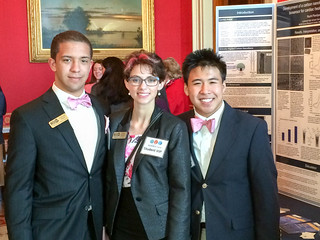
Categories: Science, Technology, Engineering and Mathematics (STEM)
Auburn University hosting forum: Additive Manufacturing – The Next Industrial Revolution
On July 30, 2015, Auburn University will be hosting a by invitation only forum on industrialized additive manufacturing.
Experts will discuss the application of this advanced technology for industries ranging from aerospace to biotechnology. Industry leaders from GE Aviation, GKN, NASA, Carpenter Technology, Alabama Laser, U.S. Army Aviation and faculty from Auburn University, University of Alabama, UAH and University of Memphis will describe the role their organizations are playing in developing, implementing and utilizing new processes and computer-aided hardware and software to produce components from material and composites once considered exotic.
A keynote address will be given by Greg Morris, the General Manager of Additive Technologies for GE Aviation.
To learn more about this day-long forum and networking reception to follow, or if you are interested in attending, please email forum organizers at auees@auburn.edu.

Categories: Science, Technology, Engineering and Mathematics (STEM), Cyber, Energy & the Environment, Health Sciences, Transportation, Food Systems, Engineering
Auburn University researcher wins National Science Foundation award for technological innovation
Auburn University mechanical engineering professor Pradeep Lall has received a top National Science Foundation award for his work as director of Auburn's Center for Advanced Vehicle and Extreme Environment Electronics, or CAVE3. His research includes developing methods for protecting electronics in harsh environments.
Lall, the John and Anne MacFarlane Endowed Professor in Auburn's Department of Mechanical Engineering, was recently awarded the 2016 Alexander Schwarzkopf Prize for Technological Innovation from the National Science Foundation's Industry/University Cooperative Research Centers program.
"This award is reaffirmation of Dr. Lall's national reputation and recognition of his seminal contributions to the field of mechanical engineering," said Christopher Roberts, dean of the Samuel Ginn College of Engineering. "His work has positioned Auburn Engineering to be a leader in harsh environment electronics research as we address the challenges in this exciting field."
Lall's research focuses on the development of methods for assuring survivability of electronics to high shock forces, vibration and extreme temperatures. He is best known for his research in the areas of reliability and prognostics for electronic systems operating in harsh environments such as:
- Combined exposure to temperature and vibration under the hood of an automobile for electronics mounted on-engine or on-transmission;
- Extreme cold or extreme hot environmental temperatures for prolonged periods of time experienced in military and defense applications;
- High g-forces experienced by electronics inside missiles;
- Corrosive attack of salt fog for electronics operating on ships at sea.
"Electronic systems have taken an increasingly important role in automotive design and operation," Lall said. "Traditional automotive electronics at one time consisted of climate control and entertainment systems. Roll the clock forward to the present day and automotive electronics have expanded to include driving assists such as antilock braking systems, traction control systems, adaptive cruise control, lane departure warning systems and more. Failure of one of these systems is no longer an inconvenience; it may be critical to the safe operation of the vehicle."
Founded in 1999 as the Center for Advanced Vehicle Electronics, CAVE3 has over the years expanded its expertise to include extreme environment electronics. Lall has been the center's director since 2008, following his appointment as associate director in 2004. Lall also directs Auburn's Harsh Environments Node of the NextFlex Manufacturing Institute, part of a national manufacturing effort on harsh environment electronics led by the U.S. Department of Defense.
CAVE3 partners with industry, government and academic agencies to address major technological challenges through precompetitive research on automotive and harsh environment electronics. This arrangement gives the center an opportunity to address the challenges before the technologies become commercialized.
Lall joined the Auburn faculty in 2002 after a distinguished industry career at Motorola, where he worked on the development and manufacture of wireless products such as cellphones and two-way radios.
"Dr. Lall's recognition with the Alex Schwarzkopf Prize is evidence of the societal and transformational impact that Auburn University is making on automotive and harsh environment technologies in everyday life," said John Mason, Auburn's vice president for research and economic development.
The National Science Foundation's cooperative research centers program was established in 1973 by Schwarzkopf to develop long-term research partnerships among industry, academe and government in areas of mutual interest. The Alexander Schwarzkopf Prize for Technological Innovation has been presented annually since 2003 to an individual or team at a member institution whose research makes an exemplary contribution to technology innovation. More than 100 universities and nearly a thousand researchers are members.
By: Chris Anthony
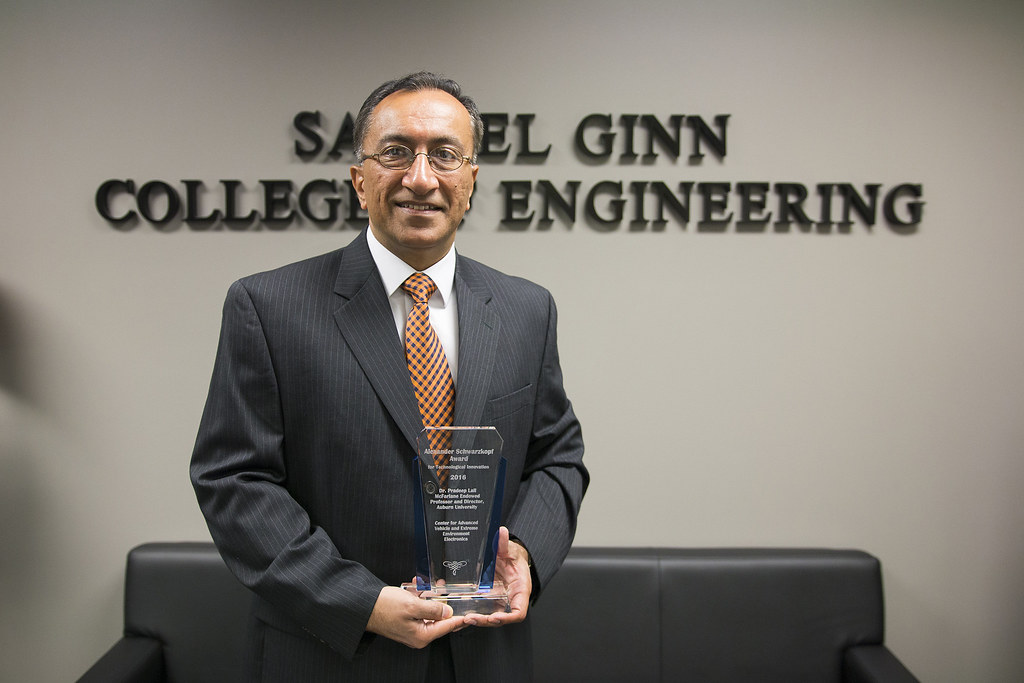
Categories: Science, Technology, Engineering and Mathematics (STEM), Engineering, Auburn In the News
Auburn University and NASA sign Space Act Agreement on additive manufacturing
Auburn University and NASA today signed a Space Act Agreement to explore and advance the applications of additive manufacturing, or 3-D printing.
The signing took place during the university’s forum on additive manufacturing, a process that uses 3-D printing to make a three-dimensional part or instrument, providing substantial technological advances and cost savings over traditional manufacturing methods. The forum was co-sponsored by Auburn University and the City of Auburn Industrial Development Board.
“Additive manufacturing is a major advancement for the future direction for the nation’s industries,” said John Mason, Auburn University vice president for research and economic development. “The partnership with NASA is an excellent opportunity to engage and leverage each other’s capabilities and expertise.”
The Space Act Agreement, in addition to focusing on additive manufacturing, is designed to advance STEM disciplines – science, technology, engineering and mathematics – by engaging students and teachers in NASA’s missions and opportunities; investigate and develop technologies; and share facilities, capabilities and technical expertise.
“As we continue developing the agency’s powerful new rocket, the Space Launch System, for deep-space missions to an asteroid and a journey to Mars, additive manufacturing techniques are making it possible to create and test innovative new designs quickly and affordably,” said Patrick Scheuermann, director of NASA’s Marshall Space Flight Center in Huntsville, Alabama. “Marshall is also pioneering the use of 3-D printers in space, and the recycling and sustainability of advanced manufacturing materials needed to enable long-term missions. We’re pleased to partner with industry and academia as we focus on technologies that not only are central to the nation’s space mission but also benefit aerospace and other activities on Earth.”
The Marshall Center has used additive manufacturing to build and test rocket engine components and manufacture the first 3-D printed parts aboard the International Space Station. These parts are currently undergoing testing at Marshall.
Auburn’s forum, “Additive Manufacturing, the Next Industrial Revolution,” brought together leaders from the private sector, academia and government to explore opportunities and challenges of using this advanced technology in manufacturing. Greg Morris, general manager of additive technologies with GE Aviation in Cincinnati, gave the keynote address. GE Aviation is bringing high-volume additive manufacturing to its facility in the city of Auburn to manufacture jet engine fuel nozzles.
“We are establishing partnerships with highly innovative businesses and organizations to spur economic growth throughout the state and region,” Auburn’s Mason said. “These relationships benefit our students with learning experiences, while companies benefit from the practical, applied solutions developed through research conducted by faculty and students.”
By Charles Martin
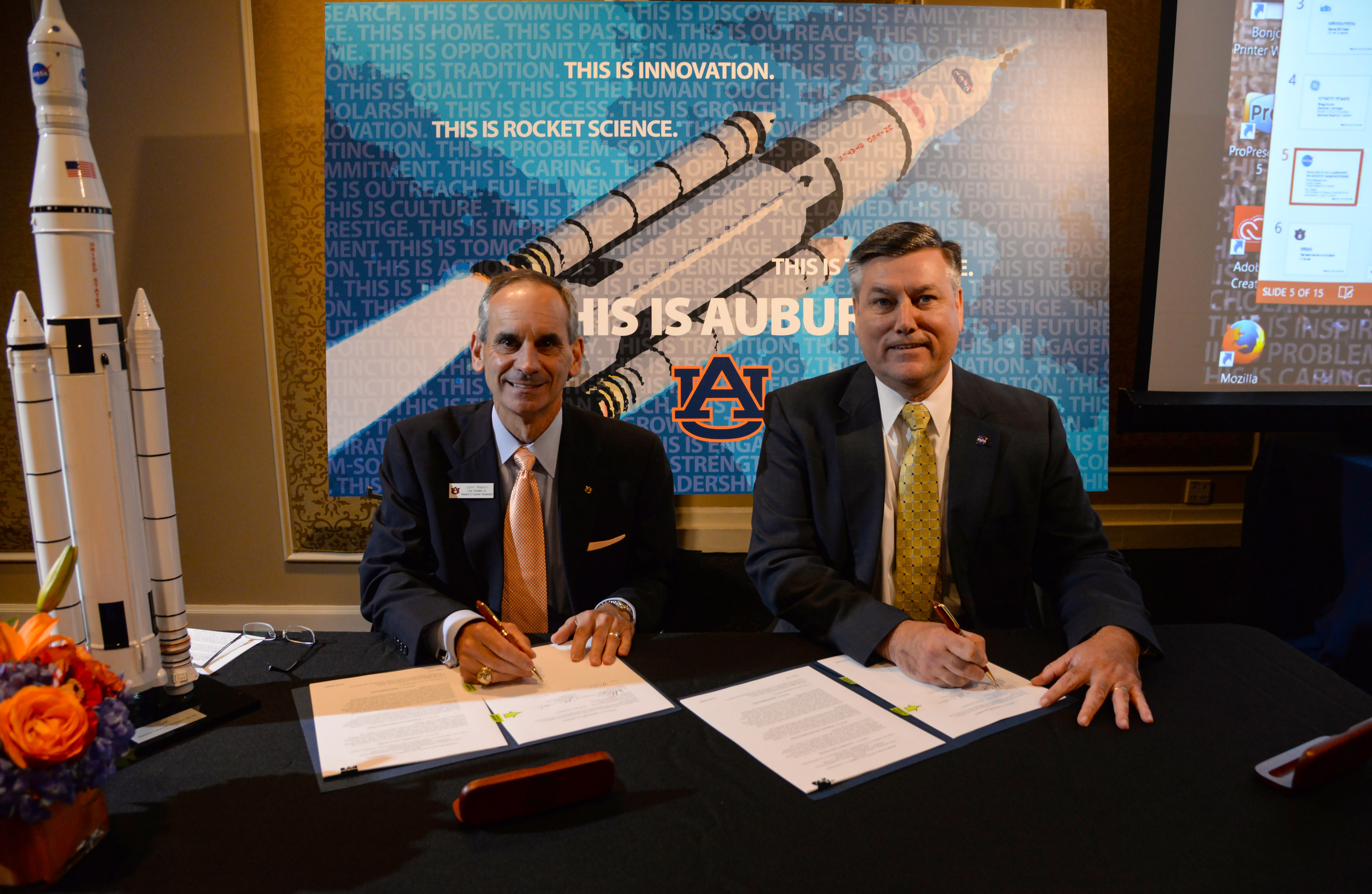
Categories: Science, Technology, Engineering and Mathematics (STEM), Auburn In the News
Student Space Program receives NSF funding to design, build and launch satellites
With a National Science Foundation grant secured by Auburn University faculty, undergraduate students at Auburn will design, build and test two CubeSat satellites that will launch into space in 2018.
CubeSats are small satellites that come in multiples of 4-inch cubes. The grant marks the first time the National Science Foundation has awarded a grant for the construction, space launch, and operation of two, three-unit, CubeSats – a project that provides invaluable workforce development experience to Auburn's undergraduate students.
"To receive this kind of funding from NSF is a real feather in our cap," said J-M Wersinger, professor emeritus in the Department of Physics and Auburn University Student Space Program director. "The Auburn University Student Space Program is now recognized as offering one of the most prestigious CubeSat programs in the nation."
Wersinger, along with Mike Fogle, assistant professor in the Department of Physics, will submit a proposal to NASA to obtain a rocket launch that will carry the CubeSats into low Earth orbit for a mission that will last approximately 18 months. The two satellites will undergo many tests and reviews before launch, which will take place in about three years.
"CubeSats are great for research because they are inexpensive to build, you can fly a lot of them at the same time and receive more information and you can look at data in almost real time," Fogle said.
The student and faculty researchers will ultimately study the structure of powerful gamma-ray flashes associated with thunderstorms in the tropical regions of Earth. Auburn launched its first, single-unit CubeSat, AubieSat-1, into space in October 2011. The two, three-unit CubeSats for the NSF-funded mission are named TRYAD 1 and TRYAD 2. "TRYAD" stands for Terrestrial RaYs Analysis and Detection.
The two CubeSats are currently being designed, built and tested solely by undergraduate student members of the Auburn University Student Space Program under the guidance of faculty in the Department of Physics and the College of Engineering. More than 30 students this semester alone are balancing their classroom obligations with 15 to 20 hours per week working in the lab on TRYAD 1 and TRYAD 2.
"The work pays off because people in industry recognize the program creates future leaders," Wersinger said. "The students are given a unique, work-force development experience where they work in teams to complete a space experiment, understand the importance of deadlines and gain a basic understanding of management and systems engineering. Also we have worked and continue to work with several NASA partners like Goddard Space Flight Center, Ames Research Center and Marshall Space Flight Center."
In addition to designing and building TRYAD 1 and 2, Auburn students will be responsible for commanding and controlling the CubeSats in space using the NASA Near Earth Network of ground stations. Through communication with the two satellites, students will also test PULSAR, a new high-bandwidth radio developed by NASA engineers, capable of transmitting 150 million data bits per second.
The project represents a collaboration with University of Alabama Huntsville, and the funding was secured by a team of scientists from UAH and Auburn University, including faculty members Wersinger and Fogle, as well as Daniel Harris, associate professor in Auburn's Department of Mechanical Engineering and Professor Saad Biaz of Auburn's Department of Computer Science and Software Engineering. The grant is in the amount of $893,873 for a project titled, "Collaborative Research: CubeSat: Observing Terrestrial Gamma-ray Flash (TGF) Beams With A Pair Of CubeSats."
UAH representatives on the project are responsible for developing the science instrument used to detect the gamma-rays while on orbit. They will also collect and analyze the science data, but Auburn University will have access to the data before it is distributed to the scientific community at large.
The Auburn University Student Space Program is part of the College of Sciences and Mathematics. For more information about the college, go to http://www.auburn.edu/cosam/.
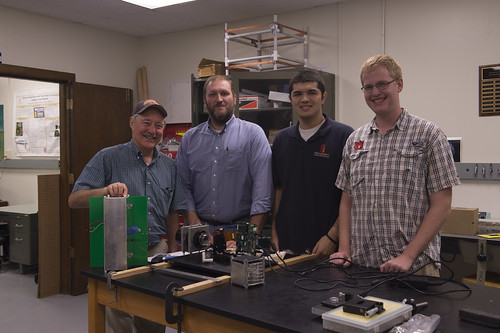
Categories: Science, Technology, Engineering and Mathematics (STEM), Engineering
2016 Auburn University Research Advisory Board Advancement of Research & Scholarship Achievement Award presented to Tatarchuk
At its fall meeting in October, Auburn University’s Research Advisory Board presented Dr. Bruce Tatarchuk, a professor in Auburn’s Department of Chemical Engineering, with the 2016 Research Advisory Board Advancement of Research and Scholarship Achievement Award. The award recognizes Tatarchuk’s innovative research accomplishments spanning a 34-year career at Auburn.
Composed of more than 40 industry professionals from across the country who actively support Auburn’s research efforts, the board established the award in 2014 to recognize significant research and scholarly activity that exemplifies and advances Auburn’s research and scholarship mission. The recipient of the annual award receives a $25,000 grant to further his or her research.
Tatarchuk, director of Auburn’s Center for Microfibrous Materials Manufacturing, was recognized for his impactful work with novel structures of matter that employ micron-diameter fibers to increase thermal and electrical conduction in kinetic processes. He holds 12 U.S. patents, as well as dozens of foreign patents, and his innovations include materials that are used in virtually all commercial aircraft operating in U.S. airspace, battery electrodes for low earth orbit satellites, electrode structures used in hybrid vehicle capacitors, and gas-to-liquid-fuel conversion processes.
“I am pleased that the Research Advisory Board has honored Dr. Tatarchuk with this prestigious award,” said John Mason, Auburn’s vice president for research and economic development. “He has shown throughout his career that the commercialization of high-quality scientific research can benefit society in major ways. This is a well-deserved honor for Dr. Tatarchuk,” Mason added.
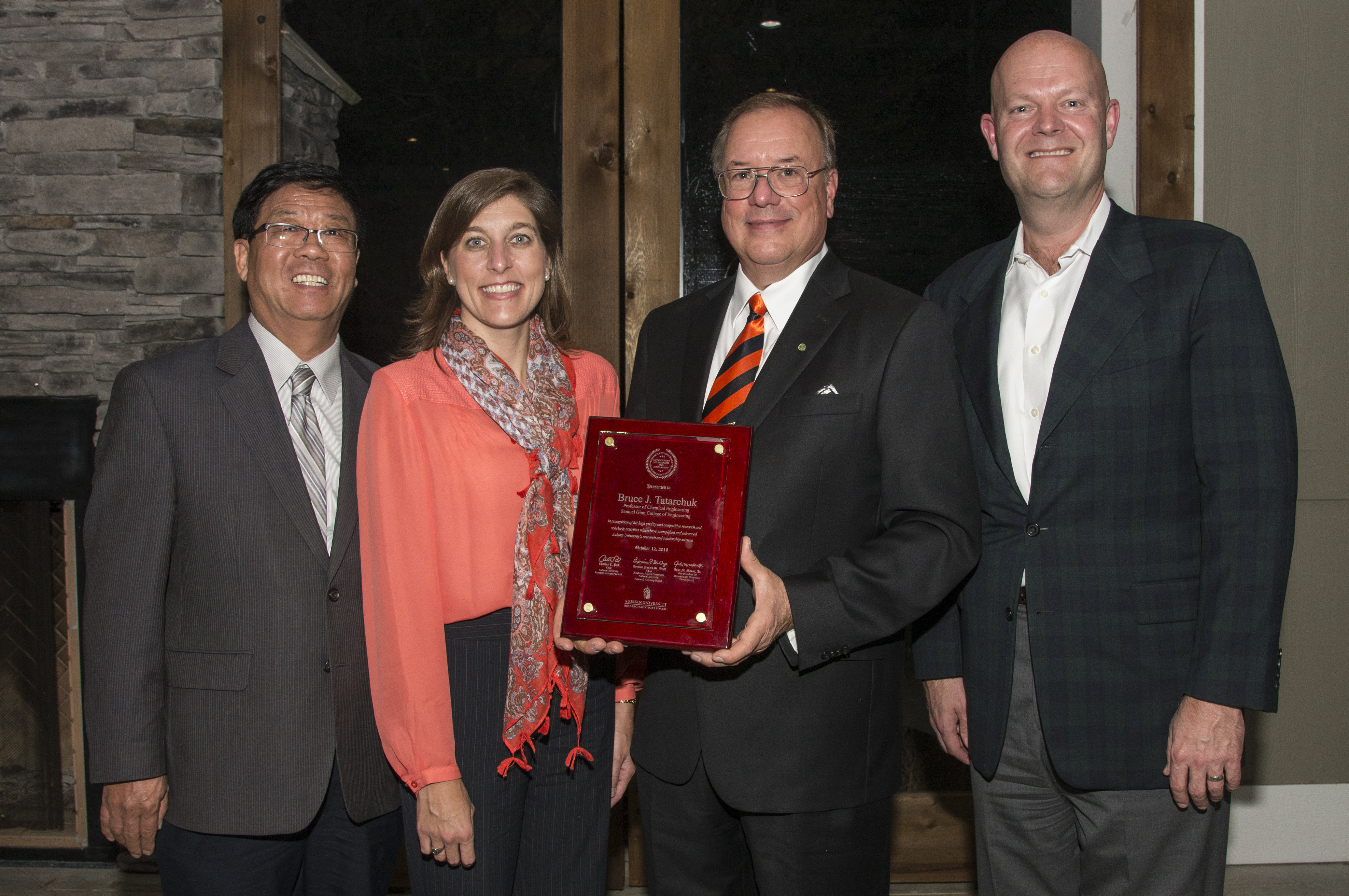
Categories: Science, Technology, Engineering and Mathematics (STEM), Energy & the Environment, Transportation
Auburn University program promotes worldwide mathematics research in southern Africa
Overtoun Jenda made a promise that he would increase the presence of American mathematical research in Africa and capitalize on an opportunity to create U.S.-Africa collaboration through Auburn University and Southern Africa Mathematical Sciences Association, or SAMSA.
When Jenda, associate provost for Diversity and Multicultural Affairs and professor in the Department of Mathematics and Statistics, attended a conference in Dar es Salaam, Tanzania, in 2009 held by SAMSA, he was the only representative from the United States.
When he returned to Auburn, Jenda, along with Ash Abebe, A.J. Meir and Peter Johnson of the Department of Mathematics and Statistics, together with southern Africa mathematicians, began to brainstorm and developed what would become the Masamu Program, meaning mathematics in the southern African region.
The group submitted a proposal for funding to the National Science Foundation and received a grant for a two-year pilot program. The first Masamu Advanced Study Institute, or MASI, was held in 2011 in Livingstone, Zambia.
The program was so successful that the department approached the NSF for more support and was granted funding for an additional five years. The NSF funding covers the cost of U.S. participants, while African mathematicians use their own sources of funding and sponsorships.
“The main purpose of the program is to promote U.S.-African collaboration on research,” said Jenda. “There are very good mathematicians in Africa, and the Masamu Program offers several research areas for faculty and students to work together.”
Each year, a MASI event is held in one of the 15 participating countries: Angola, Botswana, Lesotho, Malawi, Mozambique, Namibia, South Africa, Swaziland, Tanzania, Zambia, Zimbabwe, Ethiopia, Kenya, Madagascar and Uganda.
The institutes allow students and faculty from around the world to form teams and share research in the areas of algebra and geometry, analysis and topology, coding theory and information theory, graph theory, epidemiological modeling, numerical approximation of solutions of partial differential equations, mathematics of finance and statistics.
Faculty including Abebe, Jenda, Johnson, Erkan Nane and Kevin Phelps, from the Department of Mathematics and Statistics, serve as research team co-leaders alongside mathematicians from Africa.
“In some areas such as epidemiological modeling, the Africans have different approaches, so it’s very exciting to see how these researchers work together on problems,” said Jenda.
At its start, the program consisted of 41 research faculty, but has grown to 57 and includes Africans, Canadians, Europeans and Americans.
“Our 2014 MASI in Victoria Falls, Zimbabwe, was the biggest yet, and more than half of the keynote speakers there were from Auburn,” said Jenda. “A large group of Auburn students attended, and there is definitely an increase in participation from promising female mathematicians, too.”
Masamu Program participants have published research findings, completed dissertations and theses, and received appointments to fellowship, postdoctoral and faculty positions in the United States and Africa all while making new academic connections across the world.
Jenda, director of the program along with Abebe and Johnson, co-directors, organize and plan all facets of the Masamu Program through the business office of the Office Diversity and Multicultural Affairs.
The 2015 MASI will be held Nov. 20-29 in Swakopmund, Namibia, and the directors anticipate more participation than ever.
“For the future, the biggest thing is how we can sustain this great program. We hope to make this a permanent part of the College of Sciences and Mathematics and Auburn University,” said Jenda. “We’re also working to come up with new and innovative ideas so we can get continued support from NSF and other sources.”
For more information about the Masamu Program, go to https://www.masamu.auburn.edu.
By Lindsay Miles
Media: http://youtu.be/f0v3DW6eZKY
Categories: Science, Technology, Engineering and Mathematics (STEM)


